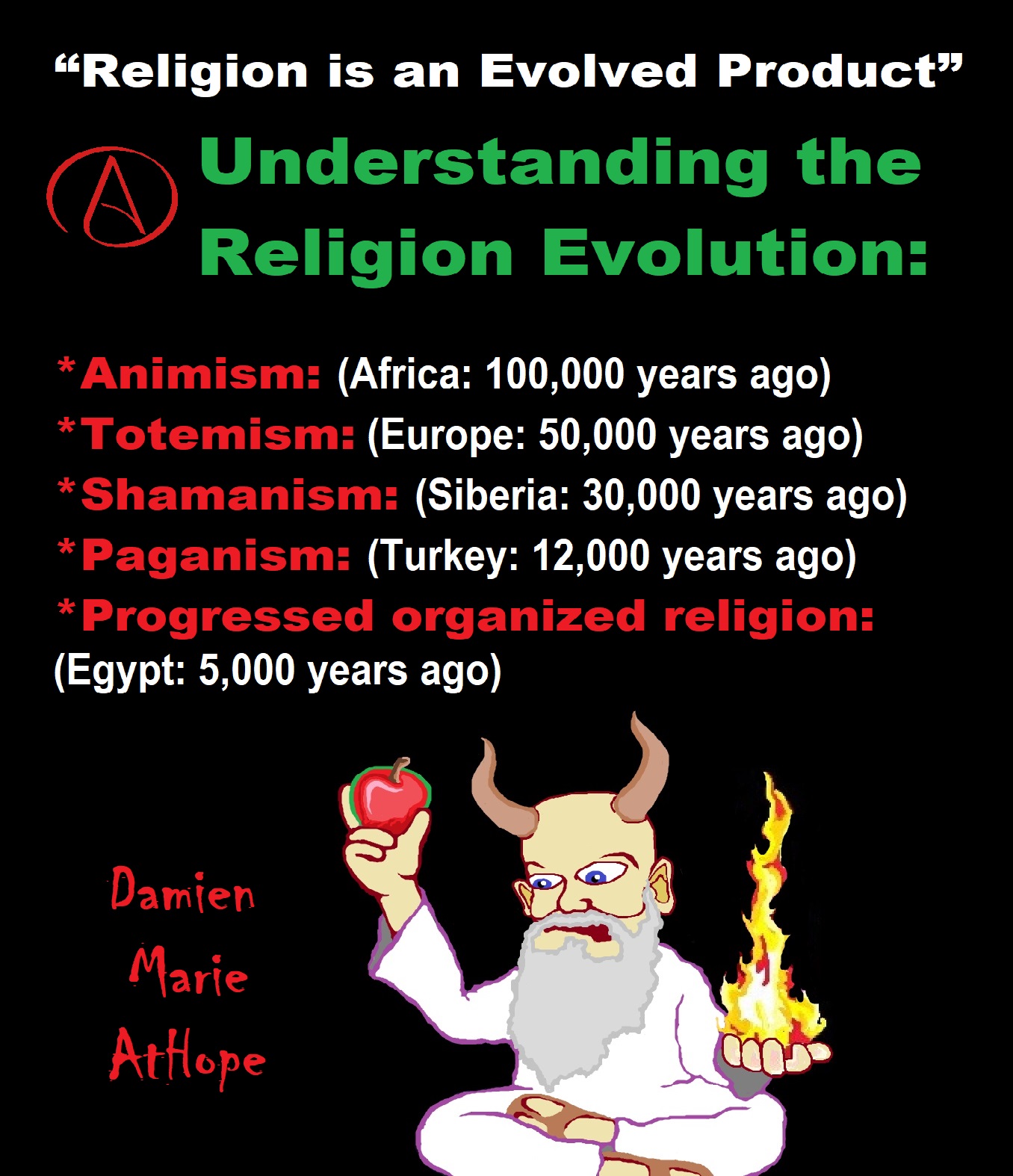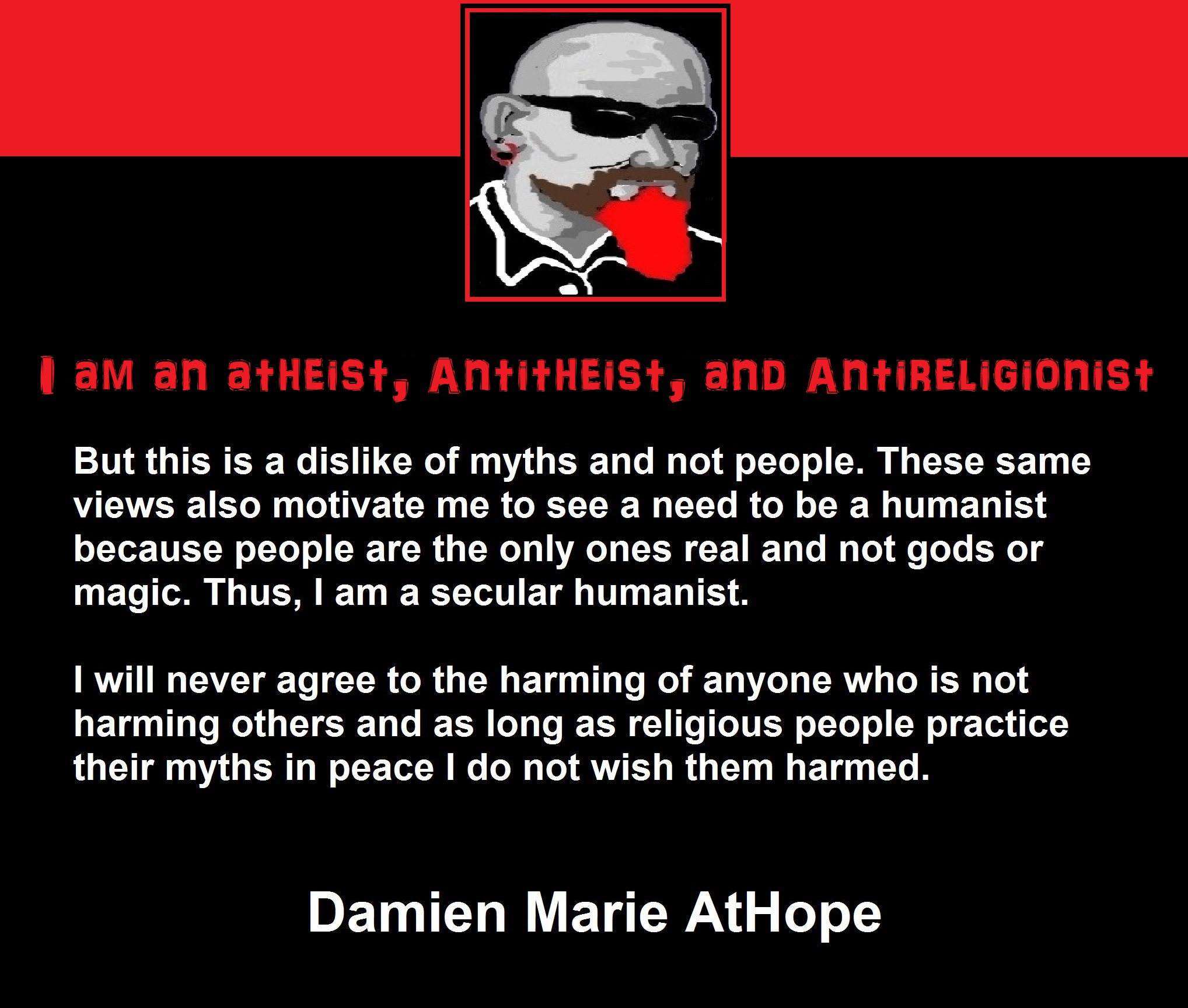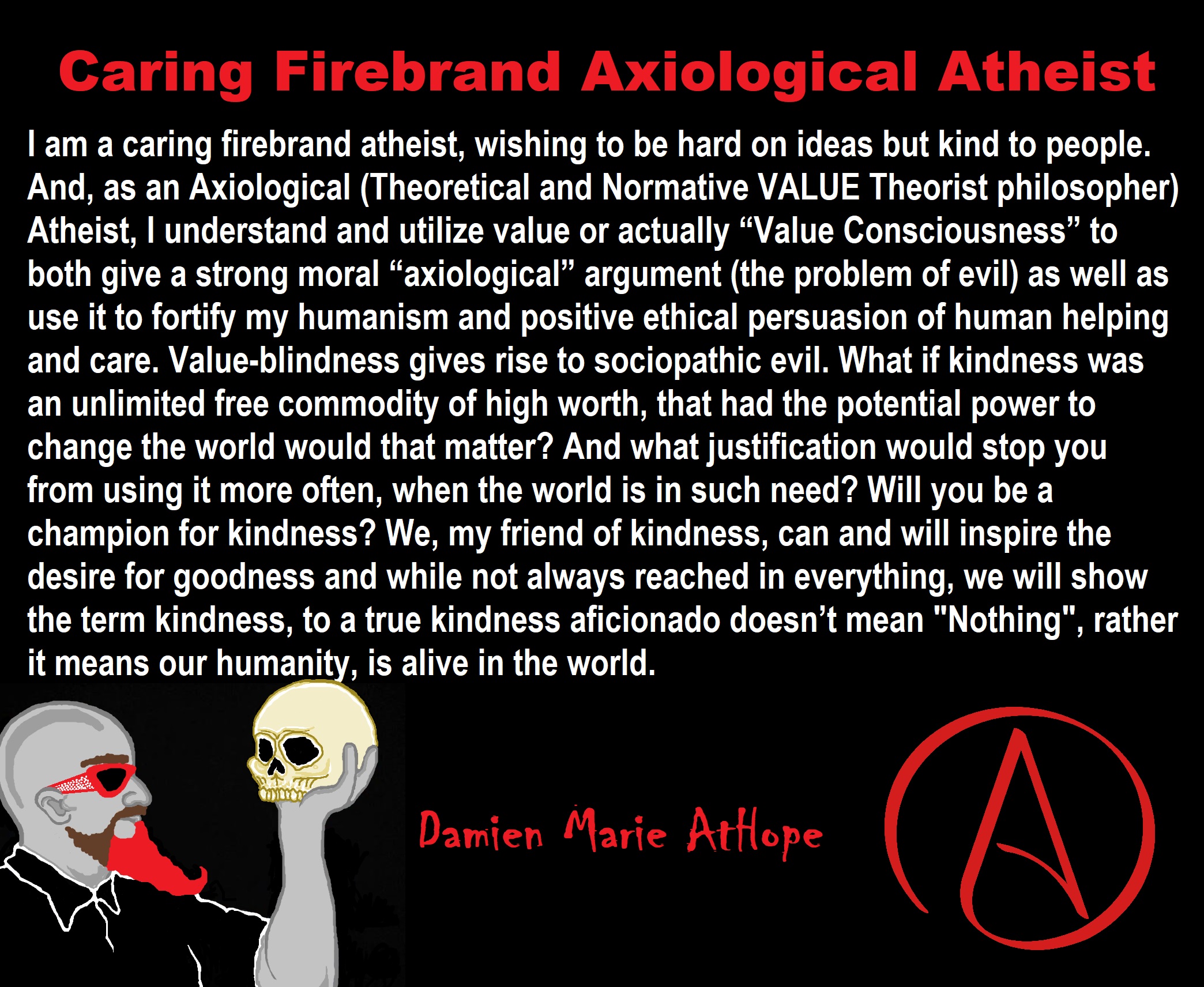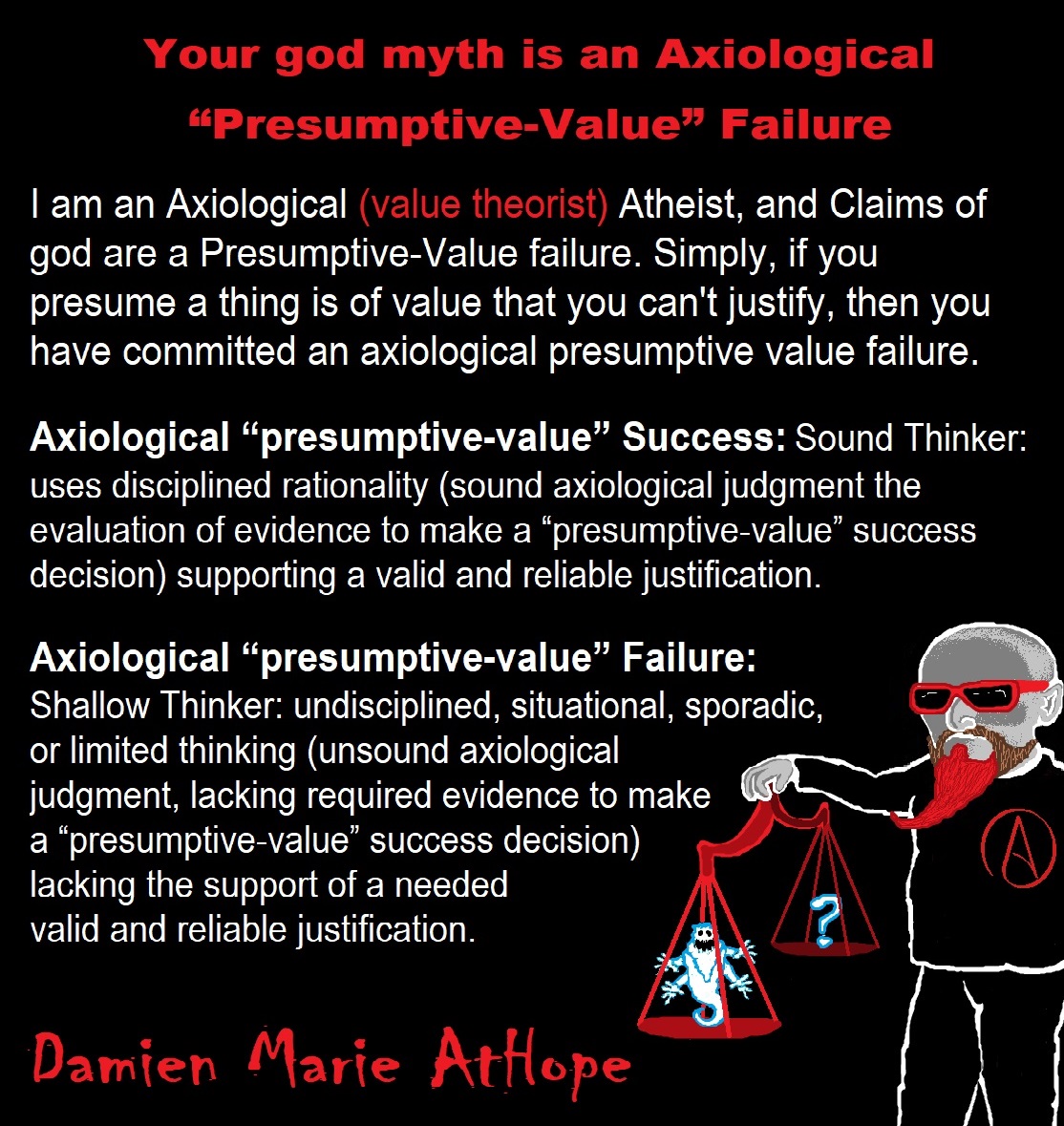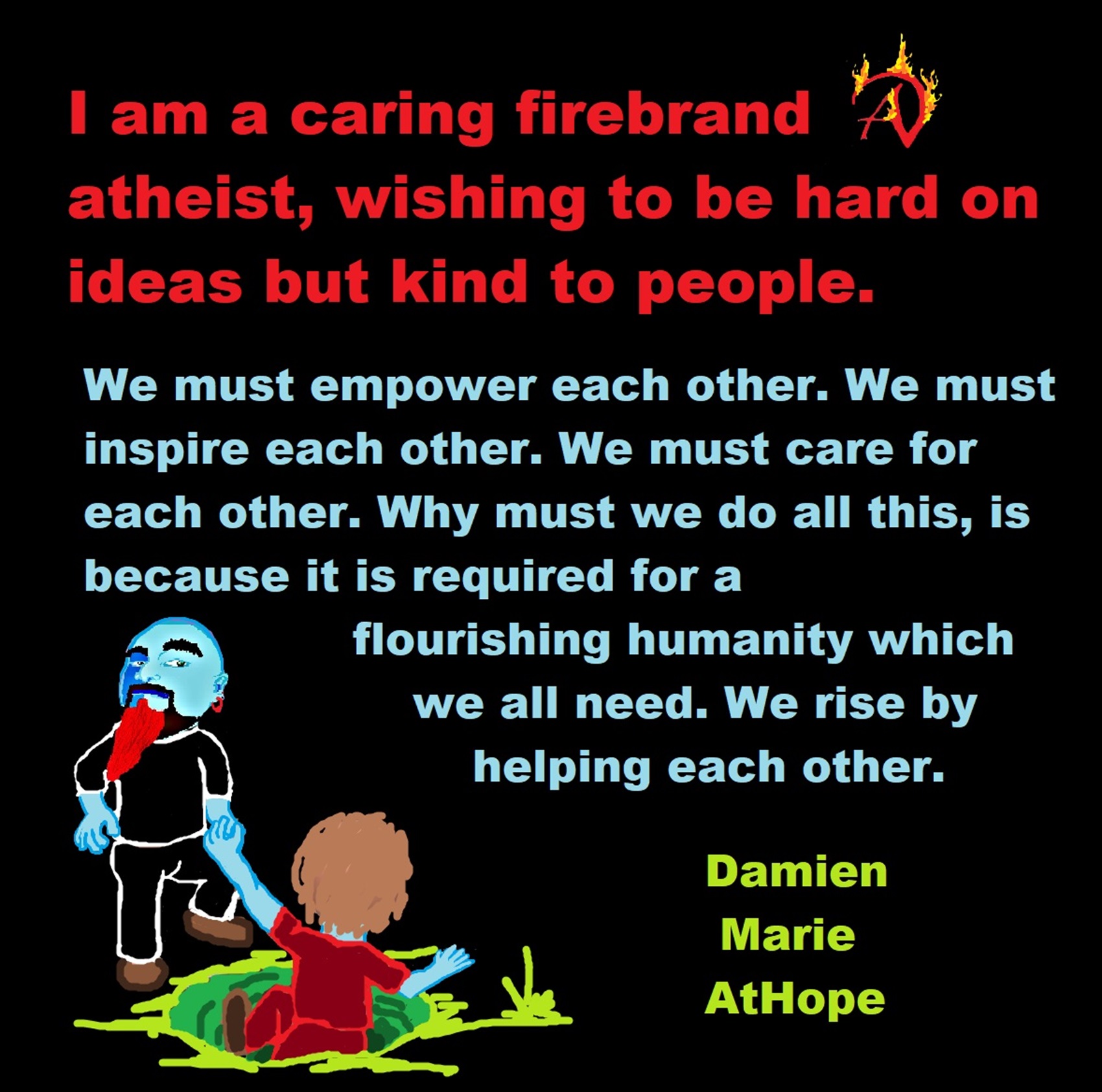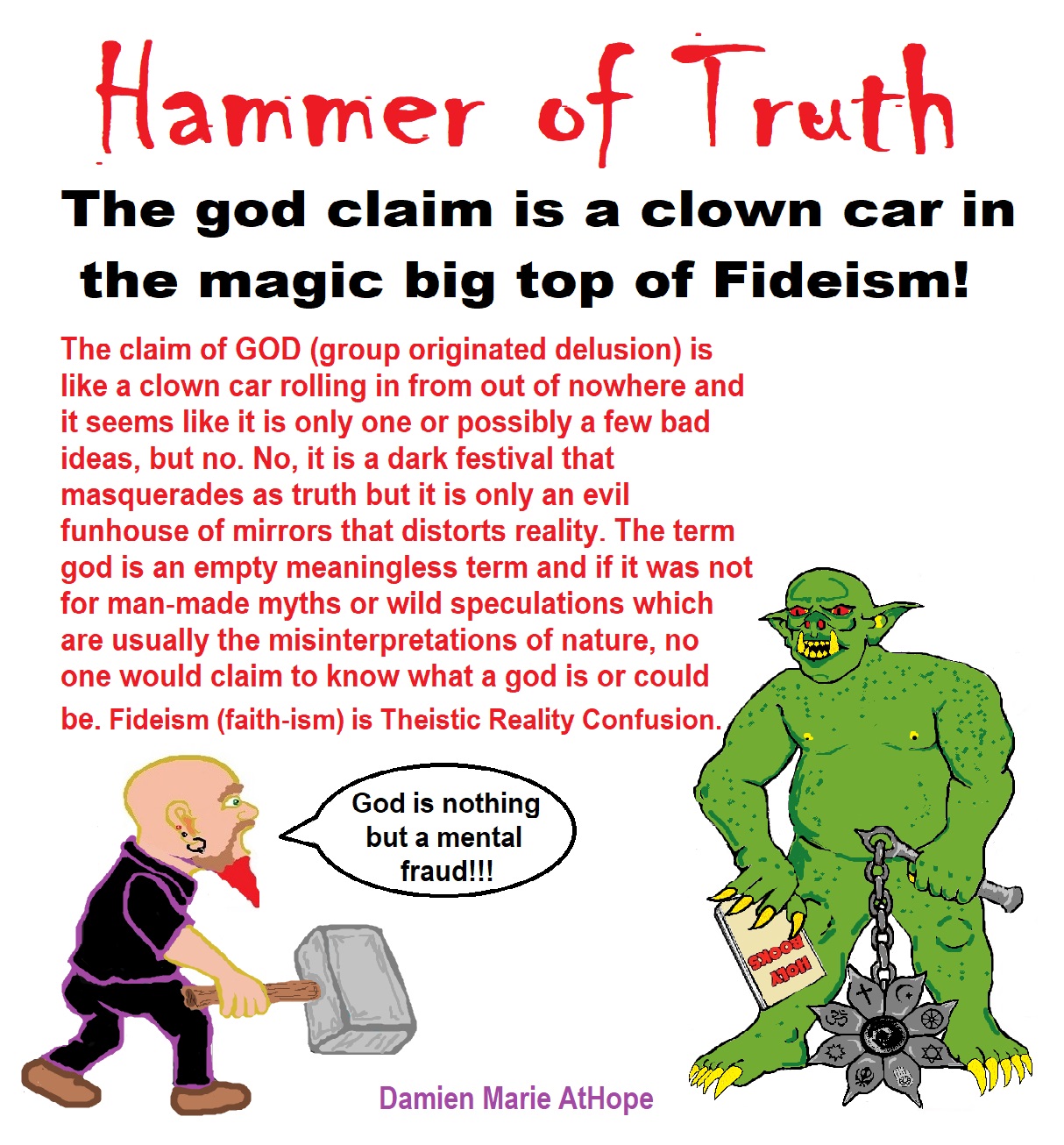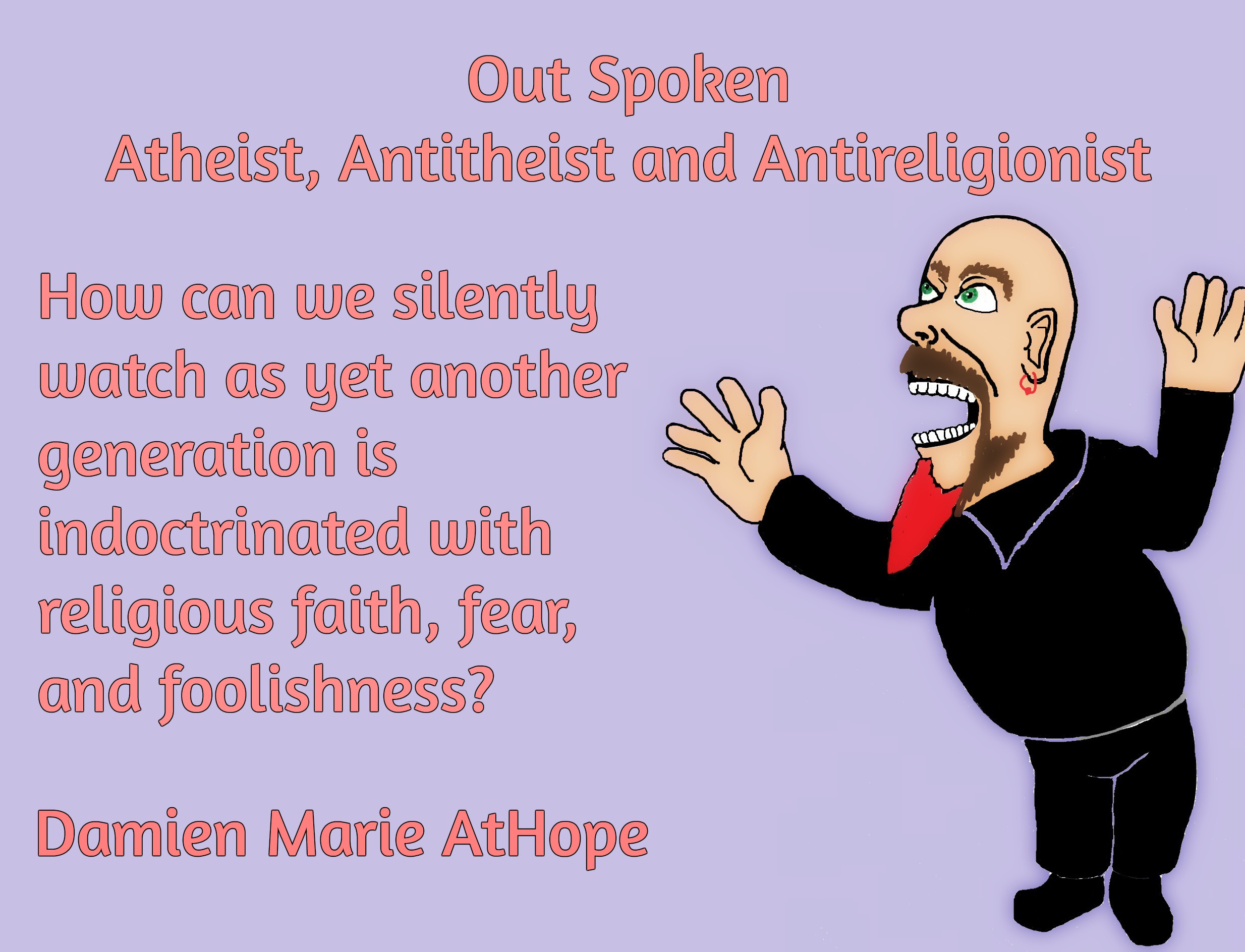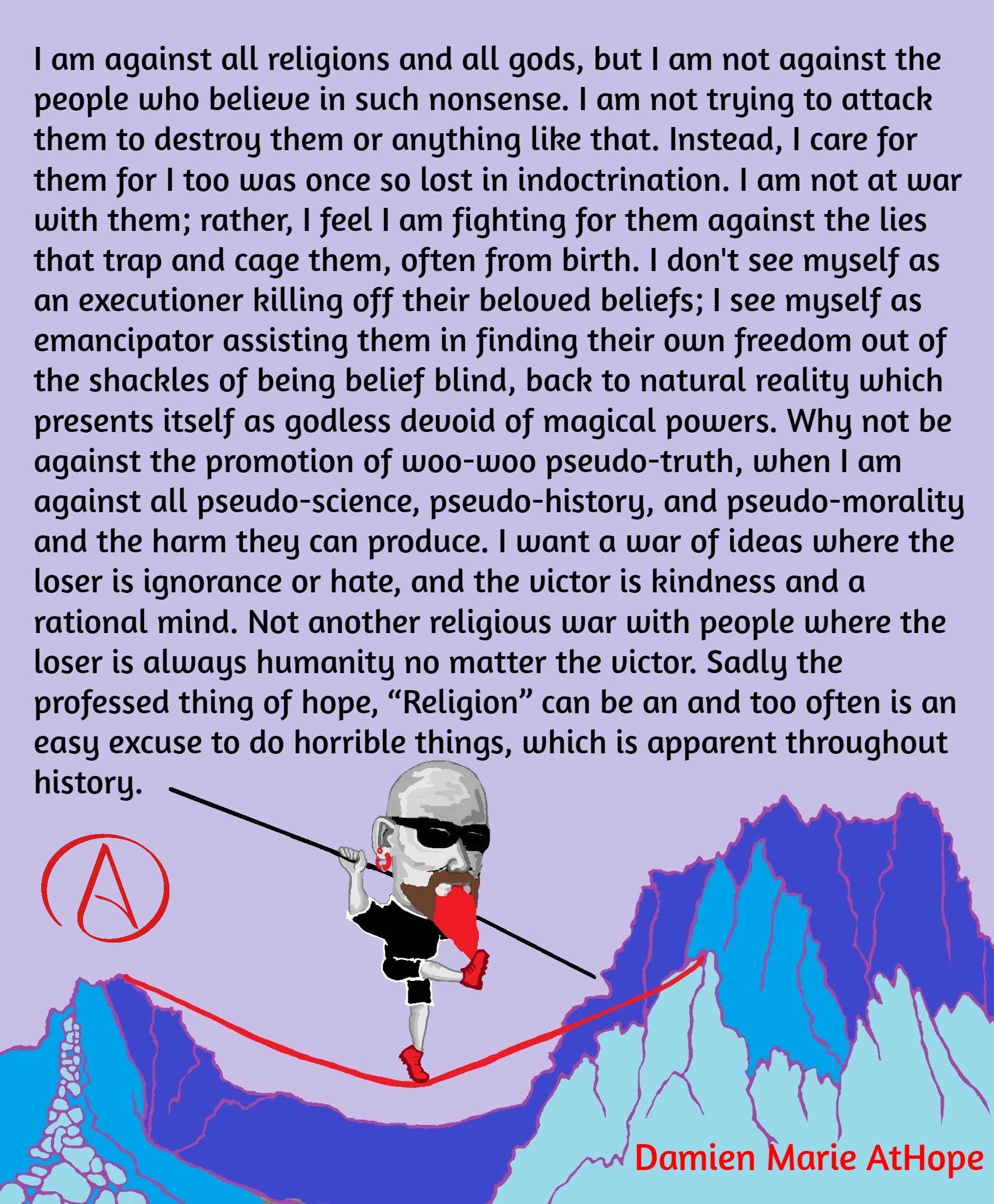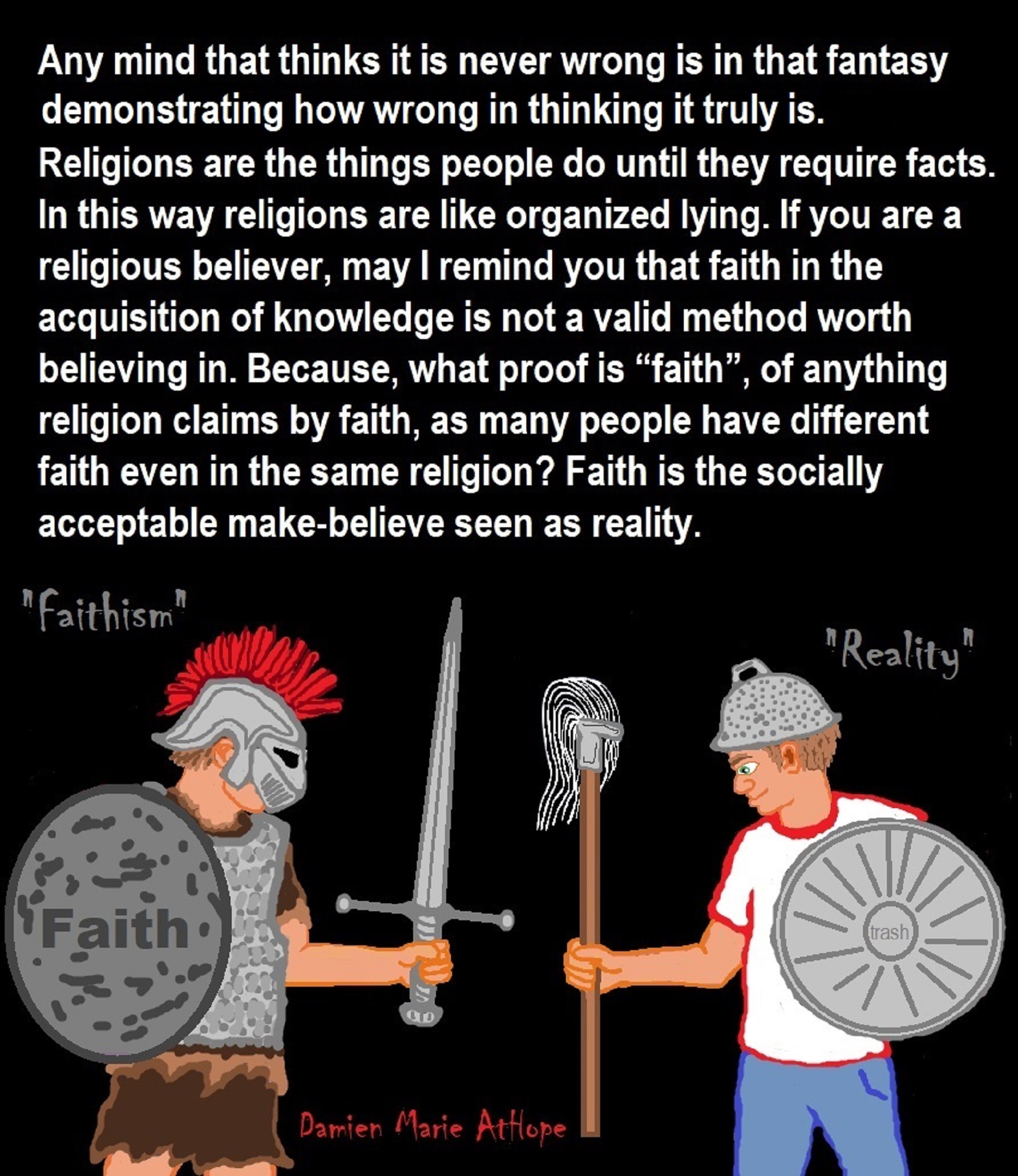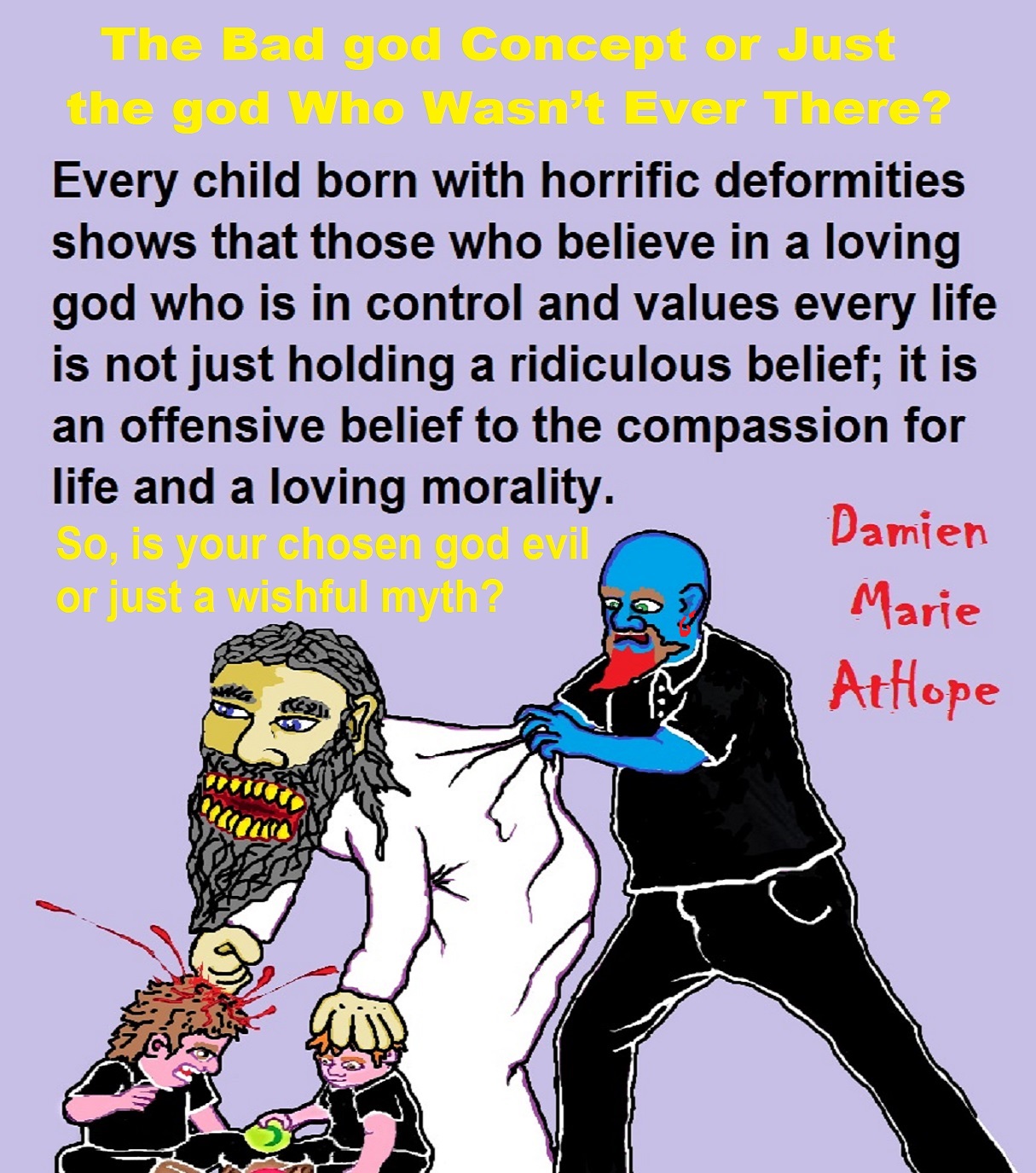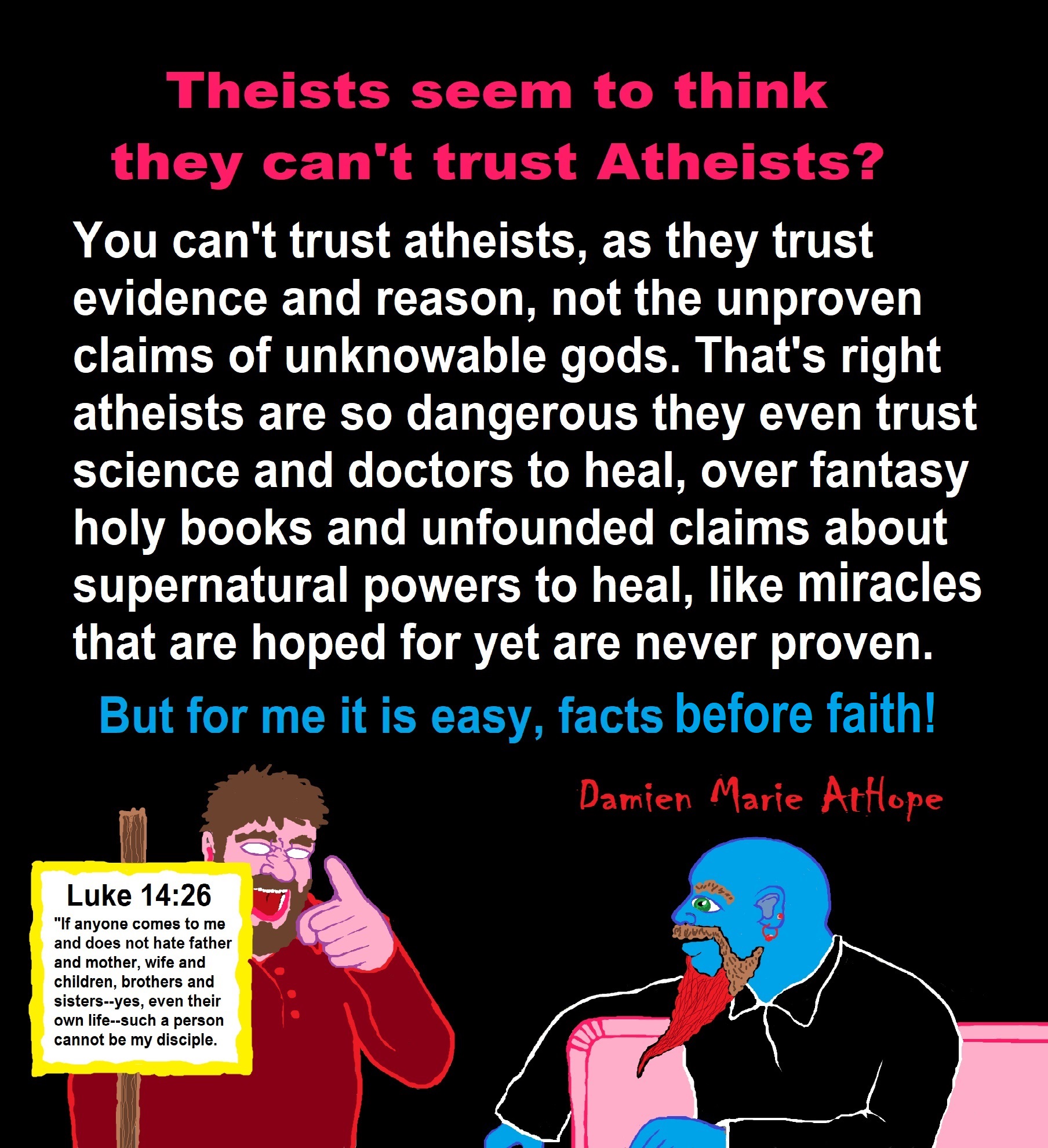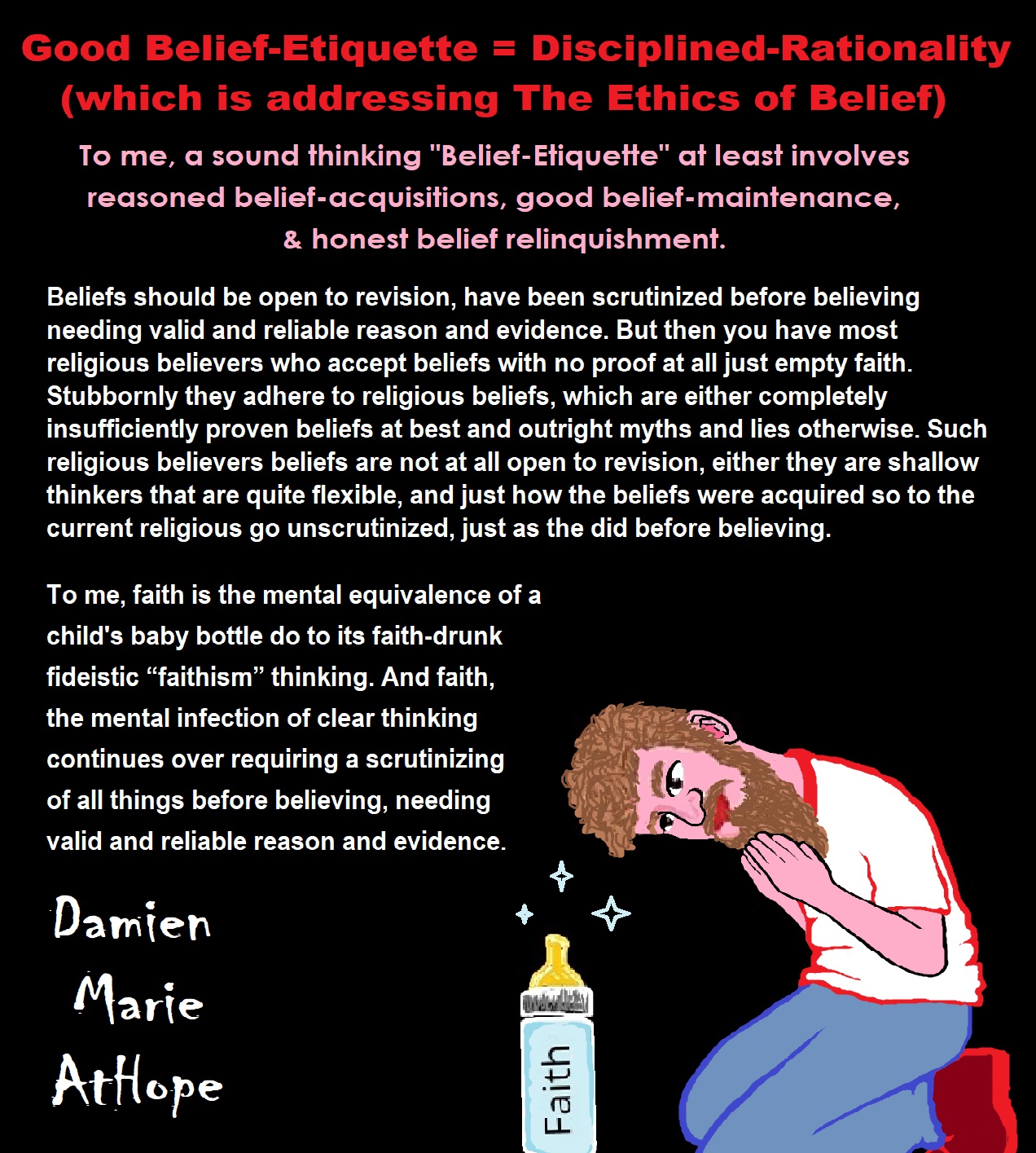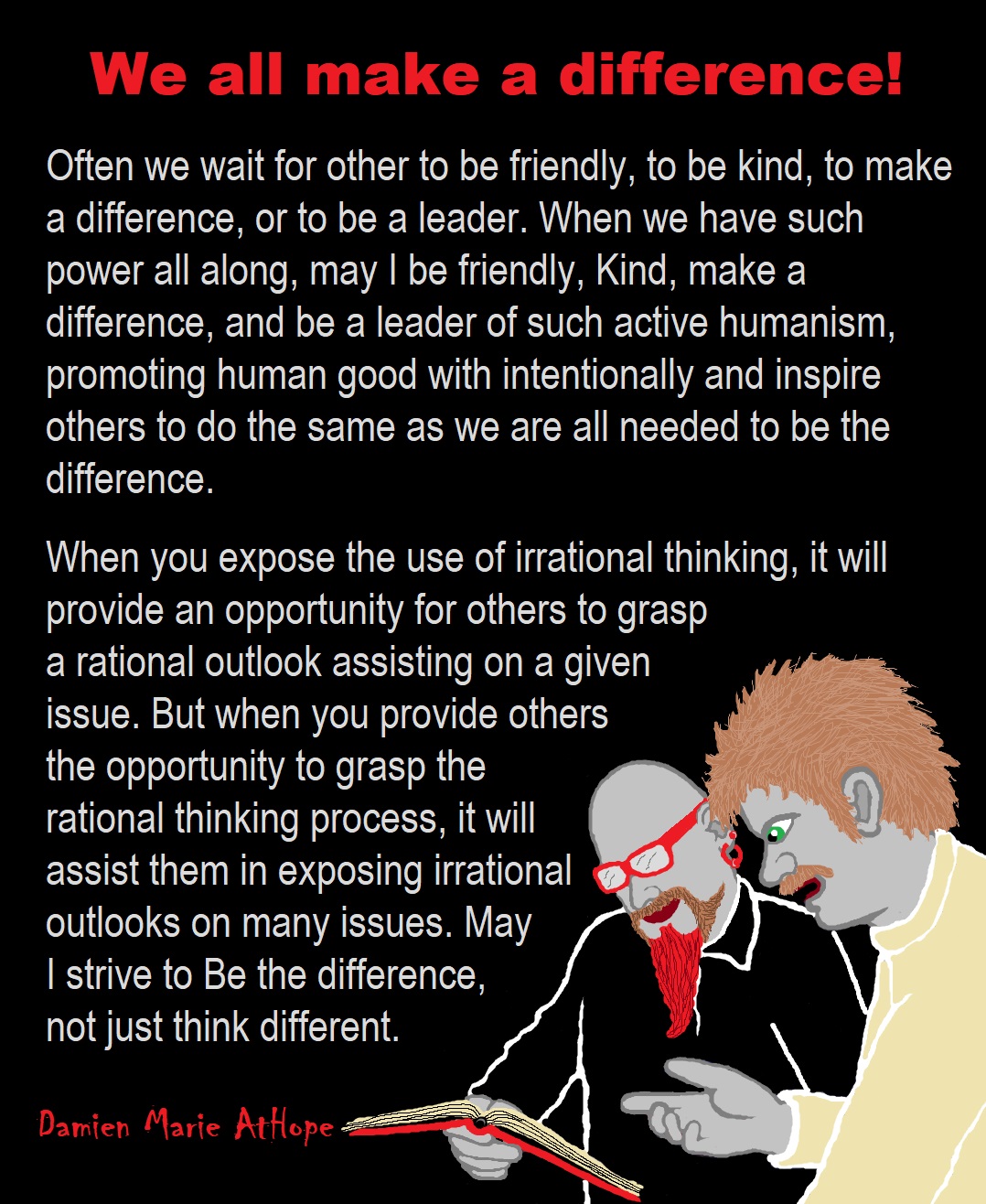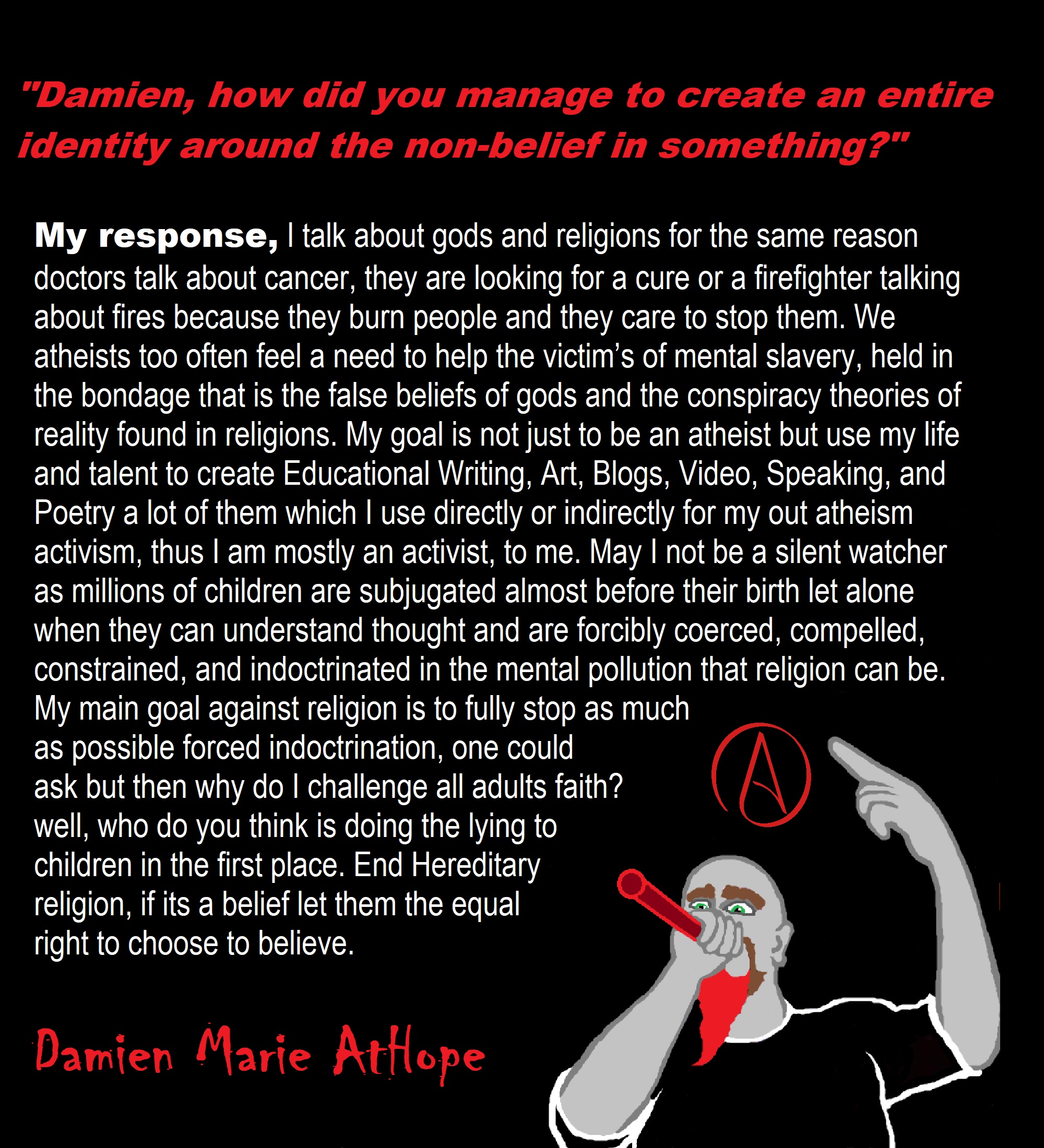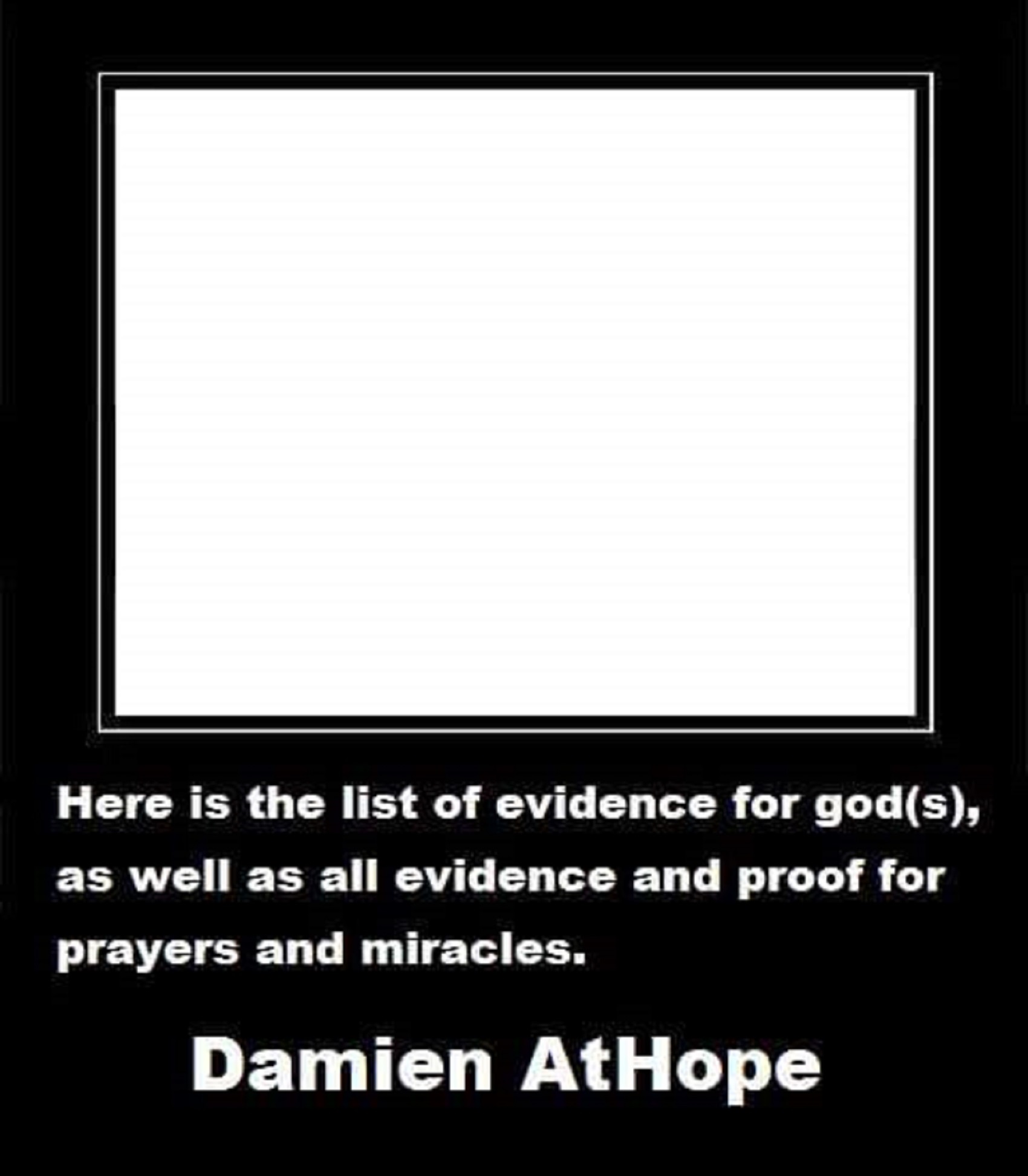
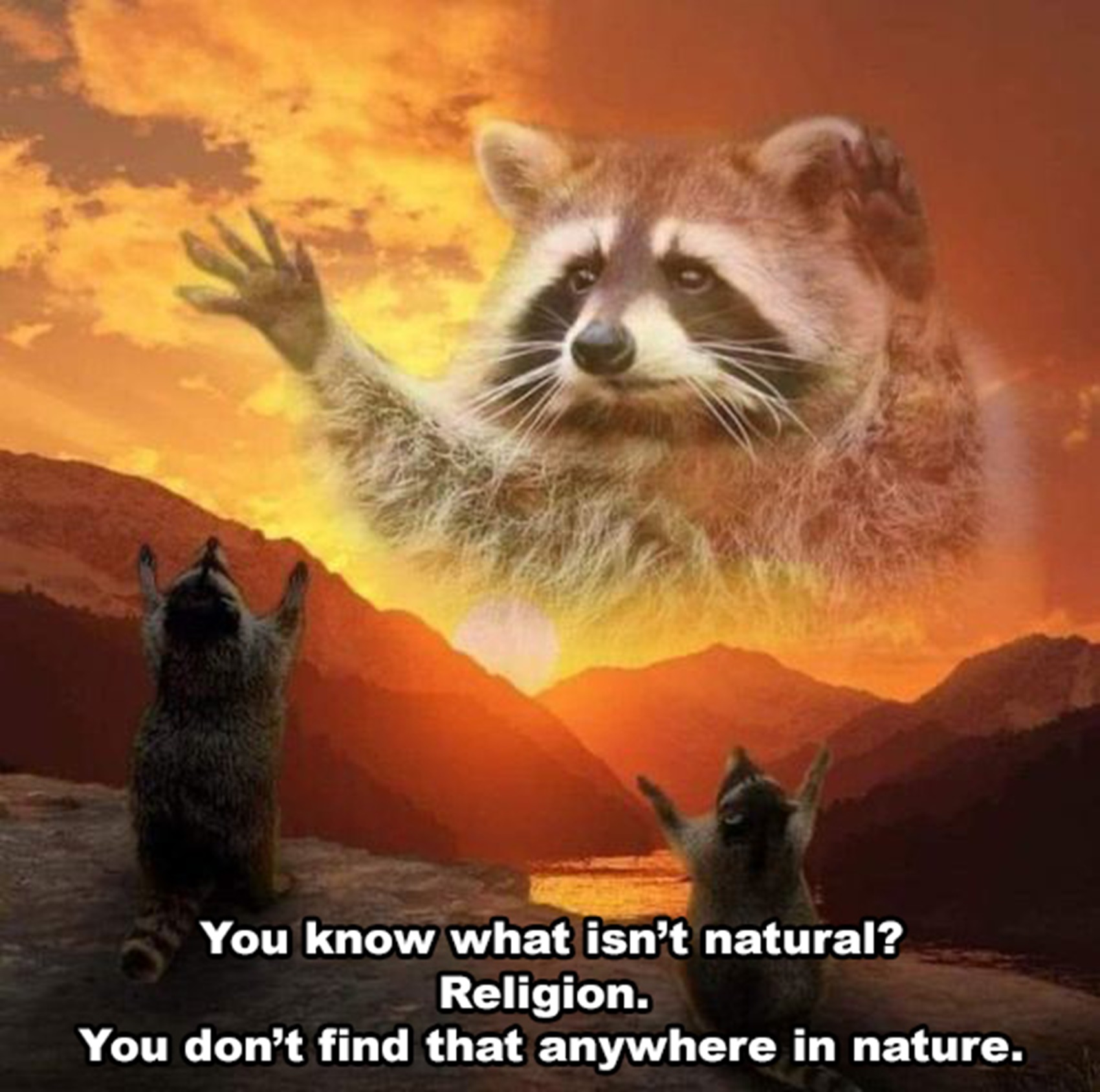
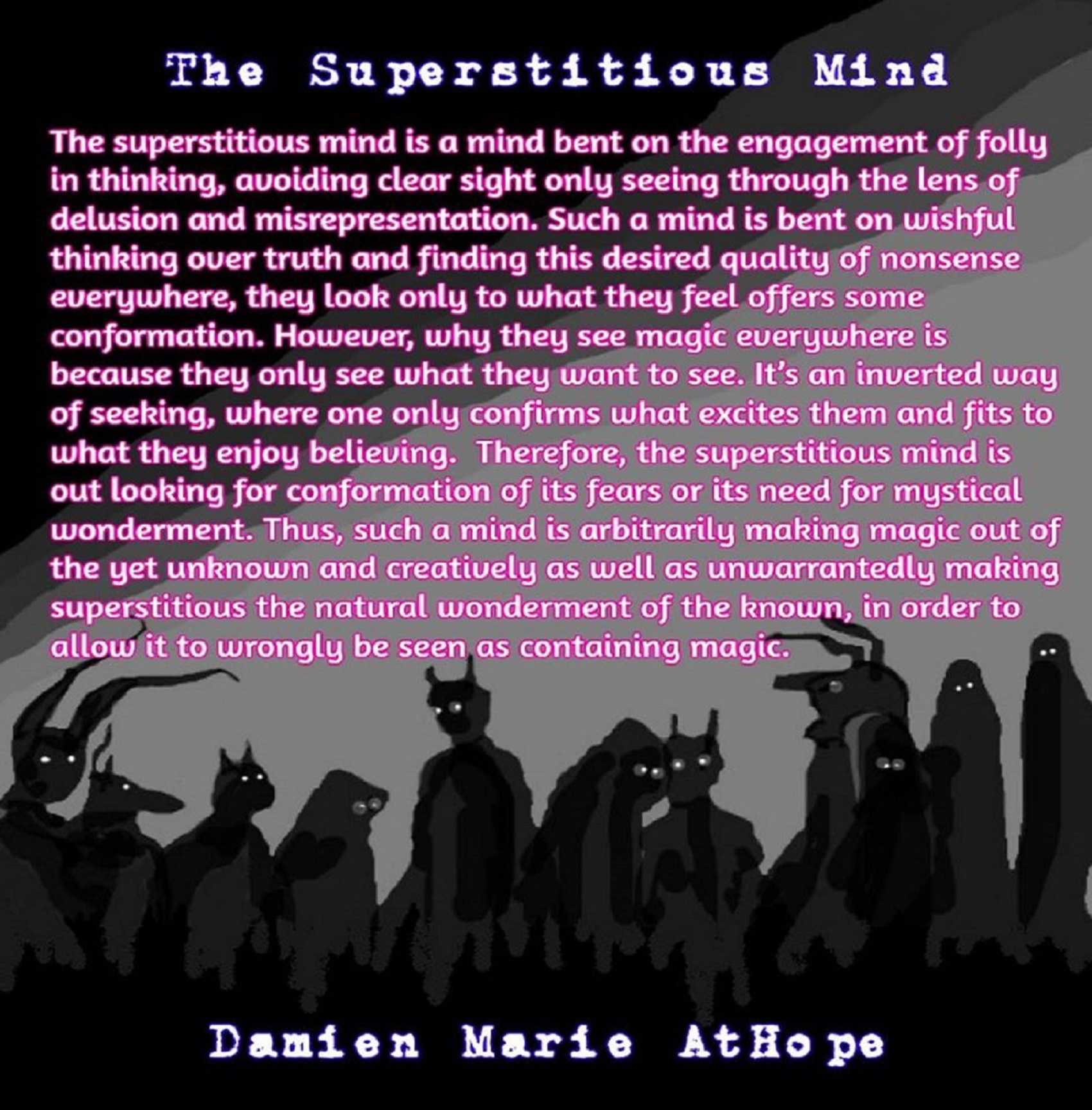
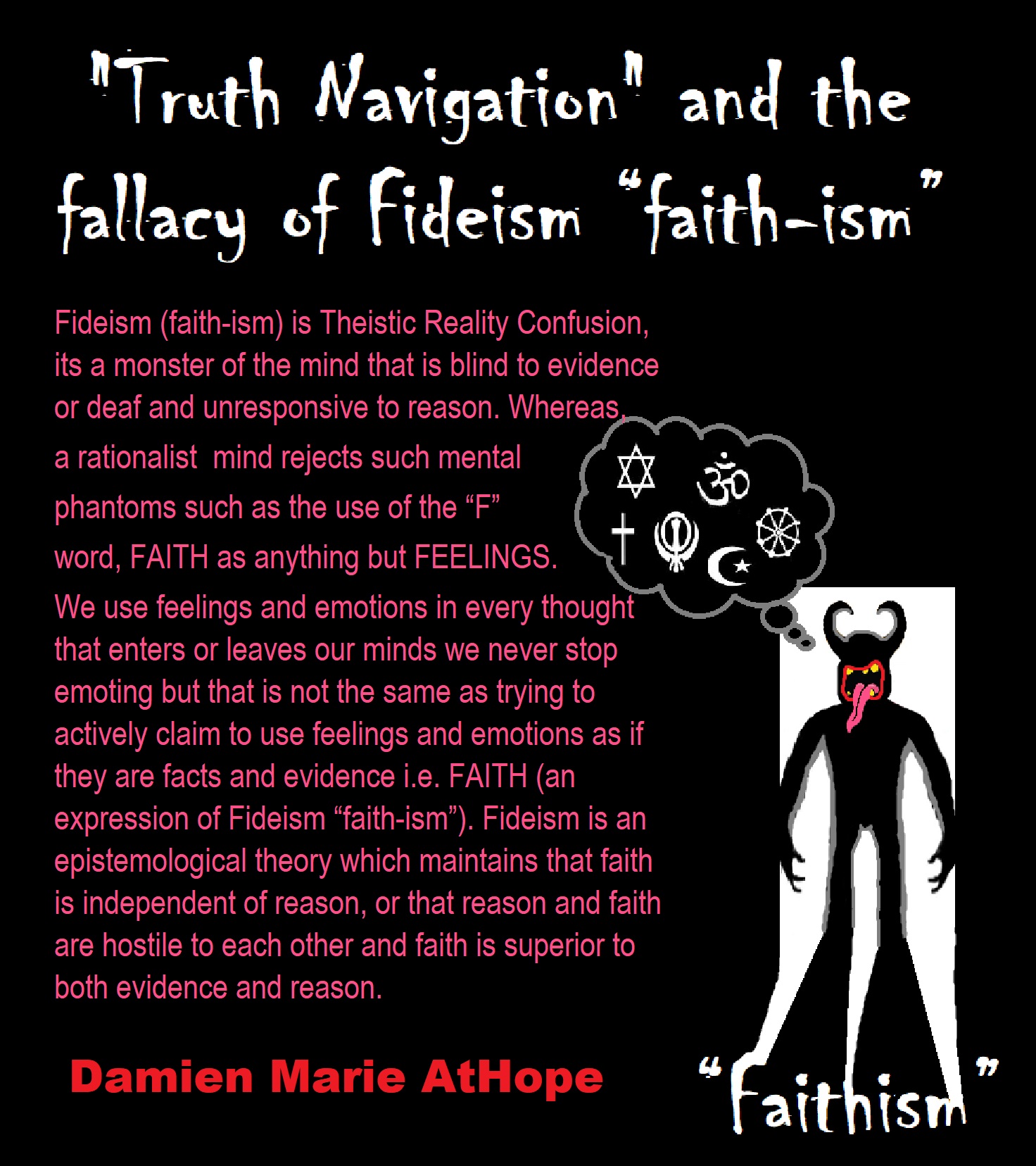
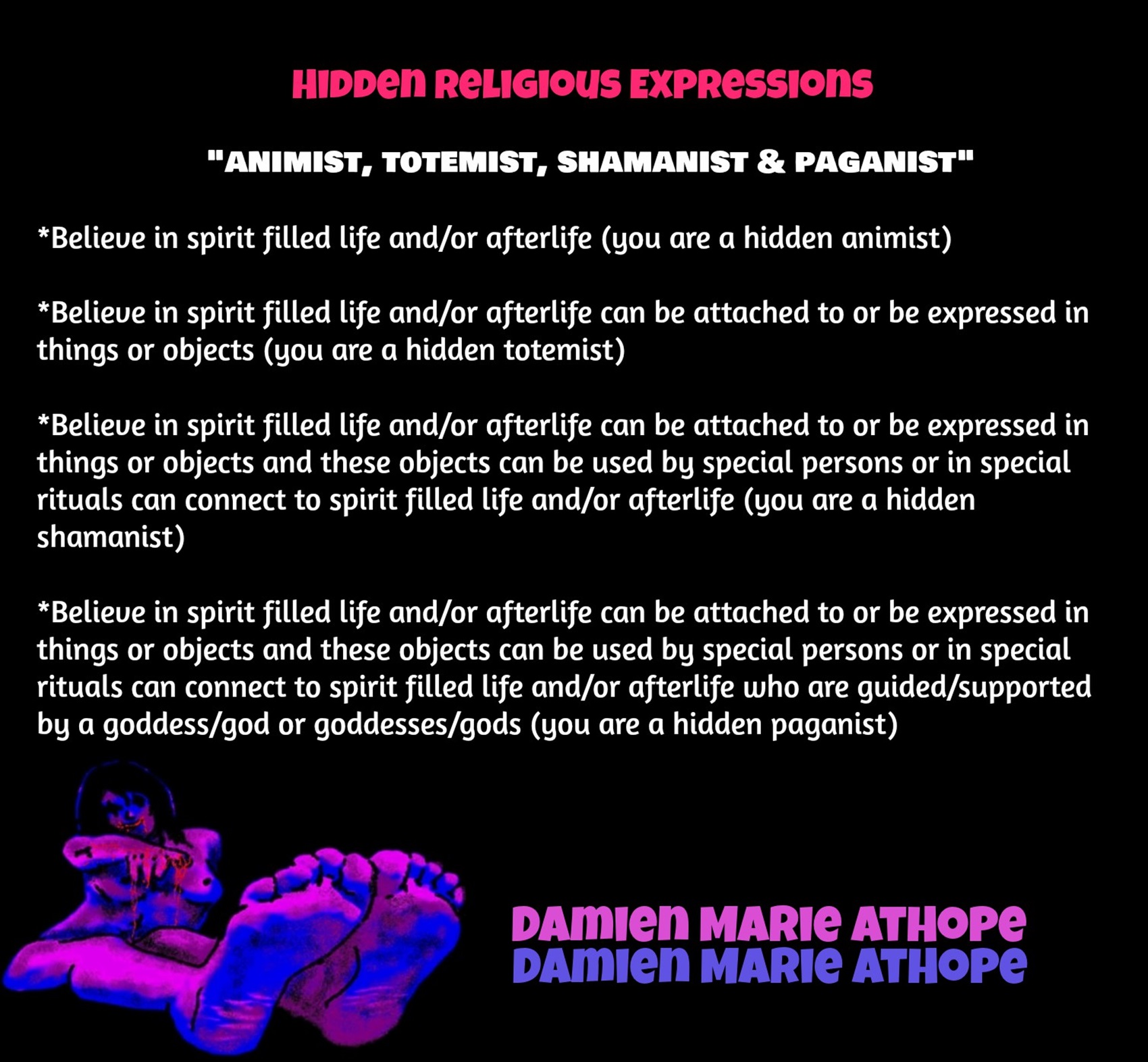

People don’t commonly teach religious history, even that of their own claimed religion. No, rather they teach a limited “pro their religion” history of their religion from a religious perspective favorable to the religion of choice.
We are like believing machines we vacuum up ideas, like Velcro sticks to almost everything. We accumulate beliefs that we allow to negatively influence our lives, often without realizing it. Our willingness must be to alter skewed beliefs that impend our balance or reason, which allows us to achieve new positive thinking and accurate outcomes.

To me, Animism starts in Southern Africa, then to West Europe, and becomes Totemism. Another split goes near the Russia and Siberia border becoming Shamanism, which heads into Central Europe meeting up with Totemism, which also had moved there, mixing the two which then heads to Lake Baikal in Siberia. From there this Shamanism-Totemism heads to Turkey where it becomes Paganism.

Do you truly think “Religious Belief” is only a matter of some personal choice?
Do you not see how coercive one’s world of choice is limited to the obvious hereditary belief, in most religious choices available to the child of religious parents or caregivers? Religion is more commonly like a family, culture, society, etc. available belief that limits the belief choices of the child and that is when “Religious Belief” is not only a matter of some personal choice and when it becomes hereditary faith, not because of the quality of its alleged facts or proposed truths but because everyone else important to the child believes similarly so they do as well simply mimicking authority beliefs handed to them. Because children are raised in religion rather than being presented all possible choices but rather one limited dogmatic brand of “Religious Belief” where children only have a choice of following the belief as instructed, and then personally claim the faith hereditary belief seen in the confirming to the belief they have held themselves all their lives. This is obvious in statements asked and answered by children claiming a faith they barely understand but they do understand that their family believes “this or that” faith, so they feel obligated to believe it too. While I do agree that “Religious Belief” should only be a matter of some personal choice, it rarely is… End Hereditary Religion!
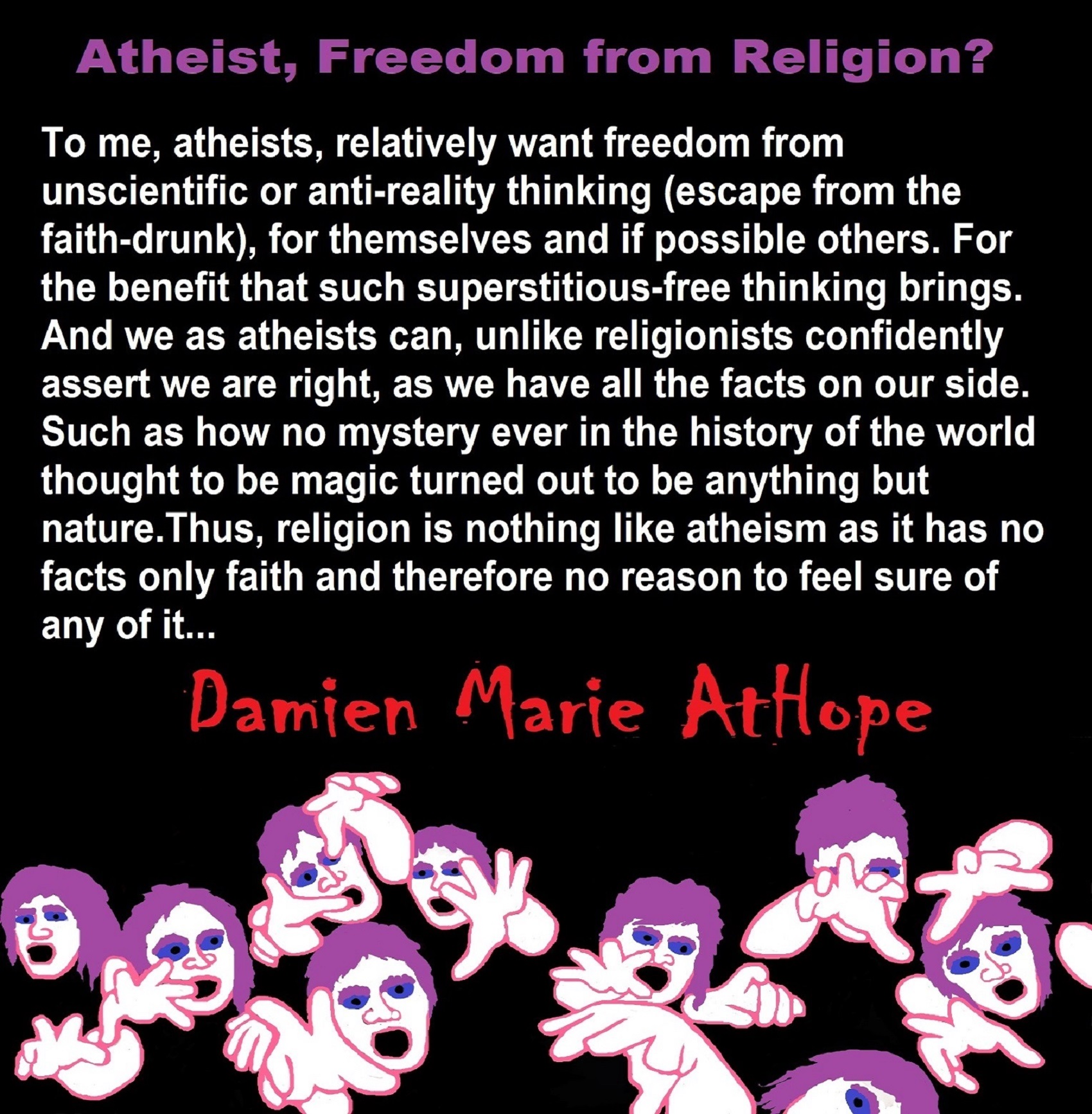
Religious Thinking Holds No Credibility
Understanding Religion Evolution:
- Animism (Africa: 100,000 years ago), (Animism | Britannica.com)
- Totemism (Europe: 50,000 years ago), (Totemism – Anthropology)
- Shamanism (Siberia: 30,000 years ago), (Shamanism | Britannica.com)
- Paganism (Turkey: 12,000 years ago), (BBC – Religion: Paganism)
- Progressed organized religion (Egypt: 5,000 years ago), (Prehistoric Egypt 40,000 years ago to The First Dynasty 5,150 years ago)
“Religion is an Evolved Product”
Do you believe in god?
Well, first, What is a god? Are you asking me if magic exists? Well, my answer as an ignostic atheist is, first prove the actuality of simple magic before you try to ask anyone about the possibility of some supreme magic.
If you are a religious believer,may I remind you thatfaithin the acquisition of knowledgeis not a valid method worth believing in. Because, what proof is“faith”,of anything religion claims by faith, as many people have different faith even in the same religion?
Let’s address some facts disproving religion as anything but human myths:
- Around 500,000 – 233,000 years ago, Oldest Anthropomorphic art (Pre-animism) is Related to Female
- Pre-Animism: Portable Rock Art at least 300,000-year-old
- Did Neanderthals teach us “Primal Religion (Pre-Animism/Animism?)” 120,000 Years Ago?
- Animism: an approximately 100,000-year-old belief system?
- Stone Snake of South Africa: “first human worship” 70,000 years ago
- Totemism: an approximately 50,000-year-old belief system?
- Australia & Aboriginal Religion at least around 50,000 years old
- Modern Humans start around 50,000 years ago Helped by Feminisation
- Out of Africa: “the evolution of religion seems tied to the movement of people”
- Possible Religion Motivations in the First Cave Art at around 43,000 years ago?
- 40,000 years ago “first seeming use of a Totem” ancestor, animal, and possible pre-goddess worship?
- 31,000 – 20,000 years ago Oldest Shaman was Female, Buried with the Oldest Portrait Carving
- Shamanism: an approximately 30,000-year-old belief system
- Early Shamanism around 30,000 to 20,000 years ago: Sungar (Russia) and Dolni Vestonice (Czech Republic)
- ‘Sky Burial’ theory and its possible origins at least 12,000 years ago to likely 30,000 years ago or older.
- Shamanistic rock art from central Aboriginal Siberians and Aboriginal drums in the Americas
- Horned female shamans and Pre-satanism Devil/horned-god Worship?
- Fertile Crescent 12,500 – 9,500 Years Ago: fertility and death cult belief system?
- 12,400 – 11,700 Years Ago – Kortik Tepe (Turkey) Pre/early-Agriculture Cultic Ritualism
- 12,000 – 10,000 years old Shamanistic Art in a Remote Cave in Egypt
- Gobekli Tepe: “first human-made temple” around 12,000 years ago.
- Sedentism and the Creation of goddesses around 12,000 years ago as well as male gods after 7,000 years ago.
- First Patriarchy: Split of Women’s Status around 12,000 years ago & First Hierarchy: fall of Women’s Status around 5,000 years ago.
- J DNA and the Spread of Agricultural Religion (paganism)
- Paganism: an approximately 12,000-year-old belief system
- Need to Mythicized: gods and goddesses
- 12,000 – 10,000 years old Shamanistic Art in a Remote Cave in Egypt
- 12,000 – 7,000 Years Ago – Paleo-Indian Culture (The Americas)
- 12,000 – 2,000 Years Ago – Indigenous-Scandinavians (Nordic)
- Pre-Pottery Neolithic Skull Cult around 11,500 to 8,400 Years Ago?
- 9,000-8500 year old Female shaman Bad Dürrenberg Germany
- Kurgan 6,000 years ago/dolmens 7,000 years ago: funeral, ritual, and other?
- Connected “dolmen phenomenon” of above-ground stone burial structures?
- Evolution Of Science at least by 5,500 years ago
- 5,500 Years old birth of the State, the rise of Hierarchy, and the fall of Women’s status
- “Jiroft culture” 5,100 – 4,200 years ago and the History of Iran
- Progressed organized religion starts, an approximately 5,000-year-old belief system
- Origin of Logics is Naturalistic Observation at least by around 5,000 years ago.
- Ziggurats (multi-platform temples: 4,900 years old) to Pyramids (multi-platform tombs: 4,700 years old)
- “Happy Easter” Well Happy Eostre/Ishter
- 4,250 to 3,400 Year old Stonehenge from Russia: Arkaim?
- When was the beginning: TIMELINE OF CURRENT RELIGIONS, which start around 4,000 years ago.
- Kultepe? An archaeological site with a 4,000 years old women’s rights document.
- Single God Religions (Monotheism) = Man-o-theism started around 4,000 years ago?
- Confucianism’s Tiān (Shangdi god 4,000 years old): Supernaturalism, Pantheism or Theism?
- Yes, Your Male God is Ridiculous
So we see the connections and the blogs to back them up proving the evolution of religion
To me, most of the organized religions today connect back to them long-long ago, around 12,000 years ago in the Fertile Crescent, specifically it relates to the lands in Turkey, expressed ideas that mirror even, if only in a small part, most of today’s modern religious or spiritual myths. I am referring to the World’s First Temple, “Göbekli Tepe” in south-east Turkey around 12,000-year-old with stone circles were the spiritual center of a nomadic people. Religions as we think of them today, if true, would have come as full packaged things and not things more akin to playing with Legos and their ability to add and remove pieces. Religions today with their several long hidden patterns of group superstitions are developed creations. Thus, current religious thinking holds little more credibility than superstitions of our ancestors, you know the ones we think are laughable. ref
*Pre-Animism (belief in objects containing spiritual energy: magical Anthropomorphism thinking/possibly a form of Ancestor worship/Veneration of the dead) possibly by at least 300,000 years ago “the most primal stage before Animism’s early religion”
- Animism (a belief in a perceived spirit world) possibly by at least 100,000 years ago “the primal stage of early religion”
- Totemism (a belief that these perceived spirits could be managed with created physical expressions) possibly by at least 50,000 years ago “progressed stage of early religion”
- Shamanism (a belief that some special person can commune with these perceived spirits on the behalf of others by way rituals) possibly by at least 30,000 years ago
- Paganism “Early organized nature-based religion” mainly like an evolved shamanism with gods (possibly by at least 13,000 years ago).
- Institutional religion “organized religion” as a social institution with official dogma usually set in a hierarchical/bureaucratic structure that contains strict rules and practices dominating the believer’s life. And to me paganism and Institutional religion categorized into the following stages:
*primal stage of organized religion is 13,000 years ago.
*proto-stage of organized religion is around 10,000 years ago.
*progressed stage of organized religion is around 7,000 years ago.
*developed stage of organized “Institutional” religion is around 5,000 years ago.
Do you believe in god?
What really is a god? Are you asking me if magic exists? Well, my answer as an ignostic atheist is, first prove the actuality of simple magic before you try to ask anyone about the possibility of some supreme magic. I am a hardcore methodological rationalist and will believe nothing without valid and reliable reason and evidence neither will I ever be pushed any skepticism unless I first appeal to its reason. Thus my default is like a null hypothesis: “no beliefs are true” then it must be proven otherwise with valid and reliable reason and evidence before I entertain any firm belief. I strive to employ an intellectually high standard in my thinking and value good belief etiquette.
Quit Trying to Invent Your God From the Scraps of Science.
What religious in most of their arguments try to do, is to act as if they reverse engineer facts of reality, trying to prove a god something or other has to be the only way it could be the way it is. Of course, as an atheist but more importantly a supporter of science and the valid and reliable reason and evidence they work from I know religion is false. I know, the work of reverse engineering facts of reality has mostly been done and is being done by science which is why we know about the truth of evolution over creationism in the first place as well as the truth of reality that contradicts or completely challenges any argument the supporters of religion can offer. I realize they are trying to reoffer thinking that is already reasonably been disregarded as the wishful thinking fantasies it always was. Science in an abstract sense replaces old ideas for new. Whereas, religion suppresses new ideas for old. Religion is not about truth; it’s about indoctrinated faith. Do you really believe that even if clear documents demonstrate that Jesus had said he was not god, that they would stop all Belief, not hardly as it’s not about truth? Just like if clear documents proved Mohammed had said he was not really a prophet of Allah but only made it up, that they would stop all Belief, not hardly. So, again, I state it’s all about indoctrinated faith, not truth. If you are a religious believer, may I remind you that faith in the acquisition of knowledge is not a valid method worth believing in? Because, what proof is “faith,” of anything religion claims by faith, as many people have different faith even in the same religion? No, science CAN NOT be with religion as in religion needs science or appeals to the things of science as if they require their child-like myths and fantasy beliefs, whereas, science does not need or appeals to the things of religion. In fact, never was the answer religion was the answer rather it has been science removing the power of such religious inaccuracies. Science is a method to understand the world as it is, which is naturalistic only, not one shred of magic. In fact, the scientific method assumes Methodological naturalism, because that is all that has ever been found and is the most likely thing that ever will be found. As religion is not intended to represent the world as it is but instead what it is not the stupid supernatural, which is the thing of fantasy, wishful thinking, and delusion. We must not confuse beliefs, religion is beliefs built from myths devoid of corroborating evidence. Science uses corroborating evidence to establish what is true and that offers something worthy to believe.
I am an Atheist, Antitheist, Antireligionist, Humanist, Writer, Artist, Poet, Philosopher & Activist.
I wish more than simply inspiring doubt in gods and religion. I wish to expose the errors in believing that allows Belief to be maintained as reasonable, warranted, justified or supported. I wish to highlight the many errors in the thinking offered as well as the many faulty presuppositions used trying to maintain as reasonable, warranted, justified or supported; removing all of their credibility to believe in them or to keep believing. Just remember a simple rule all beliefs need something to support them or they are at best unsupported accepted assertions, arguments or ideas. At worst completely baseless, misinterpreted confusions, or outright falsehoods. See it’s like this if one feels something requires faith (unsupported cognition of acceptance) to see the thing as real; without realizing it, one has affirmed that such a thing is not likely a true part of reality. My atheism is a fell defended and philosophically rich nonbelief/disbelief position or style and its well supported thinking of axiological atheism. Axiological (value theory or value science; a social science) atheist. Or put it in an easier way think of it kind of like moral argument reasoned and ethical driven strong atheism (disbelief in god’s). Axiological atheism: (Ethical/Value theory Reasoned and Moral Argument driven) Atheism, Anti-theism, Anti-religionism, and Secular Humanism. Axiological atheism = Strong Disbelief as well as Strong Secularism and Humanism. To learn more check out: “Axiological Atheism Explained” link
I am a rationalist (Methodological Rationalism: investigate (ontology), expose (epistemology) and judge (axiology), not a skeptic, though I have skeptic friends and use Methodological Skepticism. To me, a “Rationalist”, knowing it or not will be more prone to axiology, strong atheism and or ignosticism. And “Skeptic”, knowing it or not will be more prone to nihilism, weak atheism and or agnosticism. Don’t get me wrong, “I Am a Rationalist and Support Reasonable Skepticism” link
Moreover, to value faith as a means to know reality or the truth or something is a mental weakness of wanting one’s beliefs about reality to matter more than the actual reality. Faith in relation to truth is at best just wishful emotions over rational understanding which could involve just admitting one lacks knowledge.
Here is my blog: Authoritarian Truth Seekers and Anti-Authoritarian Truth Seekers?
Really, what is a god?
So, there is no way, any theist, nor an agnostic, can honestly assess to know what a god is but then what are they doubting? It’s like you saying you without looking can affirm what is in box A compared to box B. You nor anyone can honestly know anything to get a reliable attribute to the god term (asserted unknown “god” box you have not looked inside to know any dimensions of qualities thus nothing can be formed to allow valid beliefs, nor can you understand it to even offer a sound prediction other than it must be unrealistic or outside reality: thus you cannot claim anything is inside the hypothetical available posable attributes of this unknown box you have not looked inside, thus, not you nor anyone can justifiably assert a true proportion of the term god for anything but unfounded superstitious myths) you and others see as something is an unjustified list of things added without justification thus you don’t know nor can anyone justify claim knowing what should be added removed fro a possible god term, not one, one attribute, nothing… and each peace anyone wishes to add must be justified. All terms are empty of reality anything unless justified, there is nothing to add to justify the term god after doing so I will create a justifiably offered concept of a god something. What else do you have as a justification if you are a theist or an agnostic available something to assert?
Again I ask YOU, “What do you mean by god?”
I am all ears? It is nothing that I have to know other than the term god is offered without justifying anything in the term deserves to be in the term. Is god just an abstraction of letters devoid of any real-world relatable thing with meaning such as saying hod, zod, fod, jod, or nod, who knows its just letters put together, is this unknown whatever a woman, man, transgender, or intersex? Is god pink, black collarless? All claims to everything or anything and there is no such valid confirmation for anything wished to be added in the term god must be proven to intellectually claim to know them. No such thing has ever happened or could thus there is no justified thing called god, period. So, are an ignostic now and agree no one can justifiably claim to know anything about the term god but myth terms or descriptions? I don’t start with debunking the offered term god instead I wish to show the absurdity of claiming the term god has anything of value. I begin with an argument of presumptive value, prove the accurate values for anything you wish to define the term god I assert until this is done the term god and all connected ideas that appeal to the god terms meaning which had not even justifiably been defined. You can’t get any church to 100% agree on what a fod/god is or how they think or behave because there is no valid ontology, to begin with before everyone gets to do that, not even one of all the famous theistic apologetics nor any reported theist in history at all are the same no it’s a shit show with ideas all over the place, all are a little different you know like myths.
I am so out about my disbelief, as I support reality and not because I feel better than a believer in supernatural things, gods or religions. Actually, I too once was the same until somewhat late in my life. In fact, I did not stop being this way until I was 36. I am so open now with good belief etiquette focusing on reasoned belief acquisitions, good belief maintenance, as well as honest belief relinquishment and challenging not out of hate or loathing, but out of deep compassion and understanding. This care wishes to save the indoctrinated victims of magical thinking falsehoods. I wish then self-esteem, self-ownership, self-leadership, self-efficiency, self-empowerment, self-love and self-mastery all of which can and in some way, are undermined by God’s and Religions; which either directly attack/challenge or subvert in some lesser realized way.
Science is an intellectual endeavor to search for that which is accurate to the way the world is while religion is still desperately relying on fantasy stories and about what the world is not full of many inconsistencies as well as glaring inaccuracies in relation to true reality, thus religion is an unintellectual endeavor forcing a non-accurate/non-truth “faith” over “valid and reliable reason and evidence” so a blind searching to not understand the accurate to the way the world actually is in reality. This is likely because religions are not “real truth” searching endeavors and beyond all the other negative things, on the whole religions and their make-believe are but conspiracies theories of reality not worth believing in. Did you know Moses write nor asked for the writing of the Torah, the first five books Jewish holy book (the old testament)? Well, Moses didn’t, and neither did Jesus write nor asked for the writing of anything not one word in the Bible, just like how Mohammed did not write nor asked for the writing of the Quran: holy book of Islam. Do you see a theme? Well, here you go, because neither did Lao-Tzu write nor asked for the writing of the Tao Te Ching, the holy book of Taoism, and guess what neither did Gautama Buddha (the first Buddha) write nor asked for the writing of a book in Buddhism. And what do you know just like all the rest neither did nor guru Nanak write nor asked for the writing of Guru Gobind Singh the holy book in Sikhism?
What do you mean by god? Funny isn’t it how almost all of the world’s religions share the same facts that the claimed holy teacher never wrote their holy book and for that matter are not even sure if they are historical or made up. But please don’t say they were not fake or that we don’t know the truth about them. Ha, ha, ha, please, I feel safe in my anti-religionism, thank you very much. I am a reality revolutionary fighting hard to defend reality as it actually is in a world working hard to do the opposite. To offer that which is not true to reality is to offer a conspiracy theory about it, including the beliefs of ghosts, gods, and religions. Believe me wrong prove it with valid and reliable reason and evidence or I don’t believe you nor would anyone have good reason to either including your self if you are an honest thinker. I don’t really have trust it is just from experience I know many beliefs people like holding are not worth believing in and full of shit. Why do most religious people claim to have religious or spiritual experiences is they add make-believe to “reality.” And the general “WHY” people profess to have religious or spiritual experiences is because we are emotional beings, that while we can employ the thinking strategy of rationalism over faith or unreason/illogical beliefs, we still often seem to prefer to follow emotional driven thinking or simply learn to appeal to emotionalism. Things are not the other way around as we are not rational beings who understand the world accurately by employing the logical thinking strategies and not thinking clouded emotionalism needed to replace faith or unreason/illogical beliefs that follow such thinking, right? We are all emotional and thus will experience emotional wonder.
This common experience of things like emotional wonder or awe is just a positive emotional hijacking, as the experience of joy, but that is just the joy of being alive, it’s wholly cheapened to me by fantasy daydreaming delusions (supernatural) to this beautiful magic devoid reality. To me, rationalistic thinkers of intellectual character engaging in a thoughtful critical challenge, and thus should strive to disagree, debate, dispute, debunk, and degrade harmful unjustified beliefs (such as pseudo-science, pseudo-history, and or pseudo-morality the stuff religions love to promote) and not the swindled or reality deluded believer. However, I understand how we treat others matters even as an atheist dealing with theists. When I get angry or frustrated, I strive to have understanding and patience. When I get to where I think I will say something hurtful, so I strive, to say it a better way if possible, as I want to help not hurt. So, I wish to something not often offered to me; I wish to be kind, compassionate, and thoughtful as much as I can, as often as I can because how we treat others matters. Therefore, even as an out firebrand atheist I do respect people, I do not respect religion. I believe in people; I do not believe in religion. Tolerance has its limits for it will not stand for blind ignorance and the intolerance of bigotry, and it’s connected injustice cross that line first. I will NOT tolerate the unjust intolerance of oppression and harm.
Because I want to live a value-driven life to promote kindness and human flourishing as an axiological atheist not just the call for reason in thinking but also thinking in behaviors as well. Simply how we treat others reflects on us just like how we make others feel about themselves tells a lot about our chosen character. Thus how we choose to treat others, respond or react to others, will often identify the kind of person we are striving to be. I wish to be a person of value. I am 100 % sure not you nor anyone can honestly justify their claim of knowing even the concept of gods, if one like me simply demands a valid and reliable ontology of the term god. I see no honesty is saying that god anything as not one person can truly even say what it is and defiantly can offer no valid justification for the thinking either the concept of gods is a thinking error period. You have no ontology of god as you have not validated the term to mean anything but myths or confusions. Provide a support to even claim what a god could or could not be then validated hoe you know this and why it is valid and reasonable or as I already know, no one honestly can they must intellectually lie or be so under confusion they can’t think clear to do so. What is this god whatever you are supposedly agnostic about? if you don’t know then you don’t have something to doubt rather you are holding open a thinking error possibility from some myth others invented without reason as if it was reason.
What do you mean by god? The concept of gods begins with a faulty presupposition of an unsound thinker who has failed to demand justification an simply accepts the absurd. May the actions of my life be written deep with the poetry of my humanity. I have one big goal in life, I just want to make the world kinder. I am intelligent enough that I see I must be open to learning from everyone around me. I don’t try to compare people, Instead, I compare ideas. I am willing to have anyone teach me something and I hope I am always so wise. Some wish for empirical proof of some god. I say no start at what is god and how is it that you are claiming to know anything about it with a sound justification. I say empirical proof of what, when you cannot justify what the term god should contain? Start by justifying there is anything in the term god other than simply a three letter noise. Theists love their faith so much they unjustifiably appealed to the term god as if its attributes were a given, well they are not and to claim they are is uninformed, intellectually dishonest or confused. Actually, I know there is no theist that has done anything but start with something unjustified “the god claim” empty of worth to begin with, then take said unjustified claim to add something to this unjustifiably defined god term and then assert this willful theist with its myth and superstition driven attributes that not one of them are justified to be packed into the term god seems a kind of mental masturbation inventing unjustified attributes drunk on some wishful thinking hijacking, may simply be confused/uninformed, not truly thinking just willfully believing or outright intellectually dishonest.
What do you mean by god? God talk is unjustified until you can demonstrate that you can know anything even belongs in the term with valid and reliable reason and justification. What is a god is the first burden of proof that is required? Some wish for empirical proof of some god. I say no start at what is god and how is it that you are claiming to know anything about it with a sound justification. I say empirical proof of what, when you cannot justify what the term god should contain? Start by justifying there is anything in the term god other than simply a three letter noise. Theists love their faith so much they unjustifiably appealed to the term god as if its attributes were a given, well they are not and to claim they are is uninformed, intellectually dishonest or confused. Actually, I know there is no theist that has done anything but start with something unjustified “the god claim” empty of worth to begin with, then take said unjustified claim to add something to this unjustifiably defined god term and then assert this willful theist with its myth and superstition driven attributes that not one of them are justified to be packed into the term god seems a kind of mental masturbation inventing unjustified attributes drunk on some wishful thinking hijacking, may simply be confused/uninformed, not truly thinking just willfully believing or outright intellectually dishonest. God talk is unjustified until you can demonstrate that you can know anything even belongs in the term with valid and reliable reason and justification.
What do you mean by god? What is a god is the first burden of proof, that is required? You say some wish for empirical proof. I say no start at what is god and how is it that you are claiming to know anything about it with a sound justification. I say empirical proof of what, when you cannot justify what the term god should contain? Start by justifying there is anything in the term god other than simply a three letter noise. Theists love their faith so much they unjustifiably appealed to the term god as if its attributes were a given, well they are not and to claim they are is uninformed, intellectually dishonest or confused. It is not intellectually honest to support that that lacks a sound justification.
What do you mean by god? I am a Methodological Rationalist, I rarely am pushed to doubt as a default, instead, I see reason as my default and at times it may be responsible to doubt, but I get to that conclusion because of reasoning. A common saying in pseudologic is “You can’t prove a negative.” This is, simply not true. This is clearly not true because any statement can be rewritten into the negation of its negation. Any provable statement can be written as a negative. For example, “X is true” can be rewritten as “X is not false”, a negative statement! If “X is true” can be proven true, then you have also proven a negative statement “X is not false”. Moreover, even if it is widely believed that you can’t prove a negative. Going so far as to have people thinking that it is a law of logic—you can’t prove that Santa Claus, unicorns, the Loch Ness Monster, God, pink elephants, WMD in Iraq and Bigfoot don’t exist. This widespread belief is flatly, 100% wrong. In this little essay, I show precisely how one can prove a negative, to the same extent that one can prove anything at all. Evidence of absence is evidence of any kind that suggests something is missing or that it does not exist. Per the traditional aphorism, “absence of evidence is not evidence of absence”, positive evidence of this kind is distinct from a lack of evidence or ignorance of that which should have been found already, had it existed. In this regard, Irving Copi writes: “In some circumstances, it can be safely assumed that if a certain event had occurred, evidence of it could be discovered by qualified investigators. In such circumstances, it is perfectly reasonable to take the absence of proof of its occurrence as positive proof of its non-occurrence.” — Copi, Introduction to Logic (1953), p. 95
Here are some links about proving a negative: Link, Link, Link, Link, Link, Link We fight IDEAS, not people, so while I wish to destroy harmful or false ideas I wish to uplift and empower people by inspiring their will to reason and know REASON is often the enemy of ignorance.
My Strongest Explicit Atheism “positive” / “strong” / “hard” atheists similar to Antitheist Atheism.
My Atheism: “Axiological Atheism”
My quick definition of Axiology?
Axiology is a philosophy (value theory) and a social (value science) science (formal axiology) mainly involving the “what, why, and how” of “value” the way epistemology approaches “knowledge” as in what is of value/good/worth/beneficial/ or useful? Why is the thing in question is of value/good/worth/beneficial/ or useful? How should the value/good/worth/beneficial/ or useful thing be interacted with?
What do you mean by god? I have to challenge your beliefs because you won’t. To me, every religion was new at some point and had someone who made shit up, yes all of them, every religion. As an atheist, I am a person who disbelieves or lacks belief in the existence of god or gods. In my non-belief, I am also ignostic feeling that every theological position assumes too much about the concept of god(s). As an ignostic, I am a person who rational no idea of anything from reality whatever to label as “a concept of god” thus I can say I have no idea of anything that can connect to the term god and no reason to think anyone else can either. As an anti-theist, I am a person who is active in opposition to theism: both the concepts of god(s) as well as the religions that support them. This is because theistic concepts and theistic religions are harmful and that even if theistic beliefs were true, they would be undesirable. As an anti-religionist, I am a person who can look at religion on the whole and see it is detrimental to the progress of humanity thus am in opposition to all and every religion, not even just opposition to organized religion. In case you were wondering, I am anti-pseudoscience, anti-supernatural, and anti-superstition as well. Therefore, I am a proud anti-religionist, not just atheist or even anti-theist. Yes, I am an atheist, anti-theist, and an anti-religionist. I am against flawed superstitious magical beliefs like god(s) and/or religion. However, I am not against people. I have many strong opinions and beliefs as well as my challenge of others or I am against many types of beliefs especially if they involve supernatural or superstitious, or harm. However, I am not against people nor am I against their free right to believe as they wish. To me, everyone owns themselves and their beliefs are theirs as well and will be held accountable for those beliefs. Thus, to me, not I or anyone has the right to force people on what to believe. I as others do have the right to voice our beliefs, just as I or others then have the right to challenge voiced beliefs. Long live mental freedom. Proudly, I am an atheist, anti-theist, and an anti-religionist.
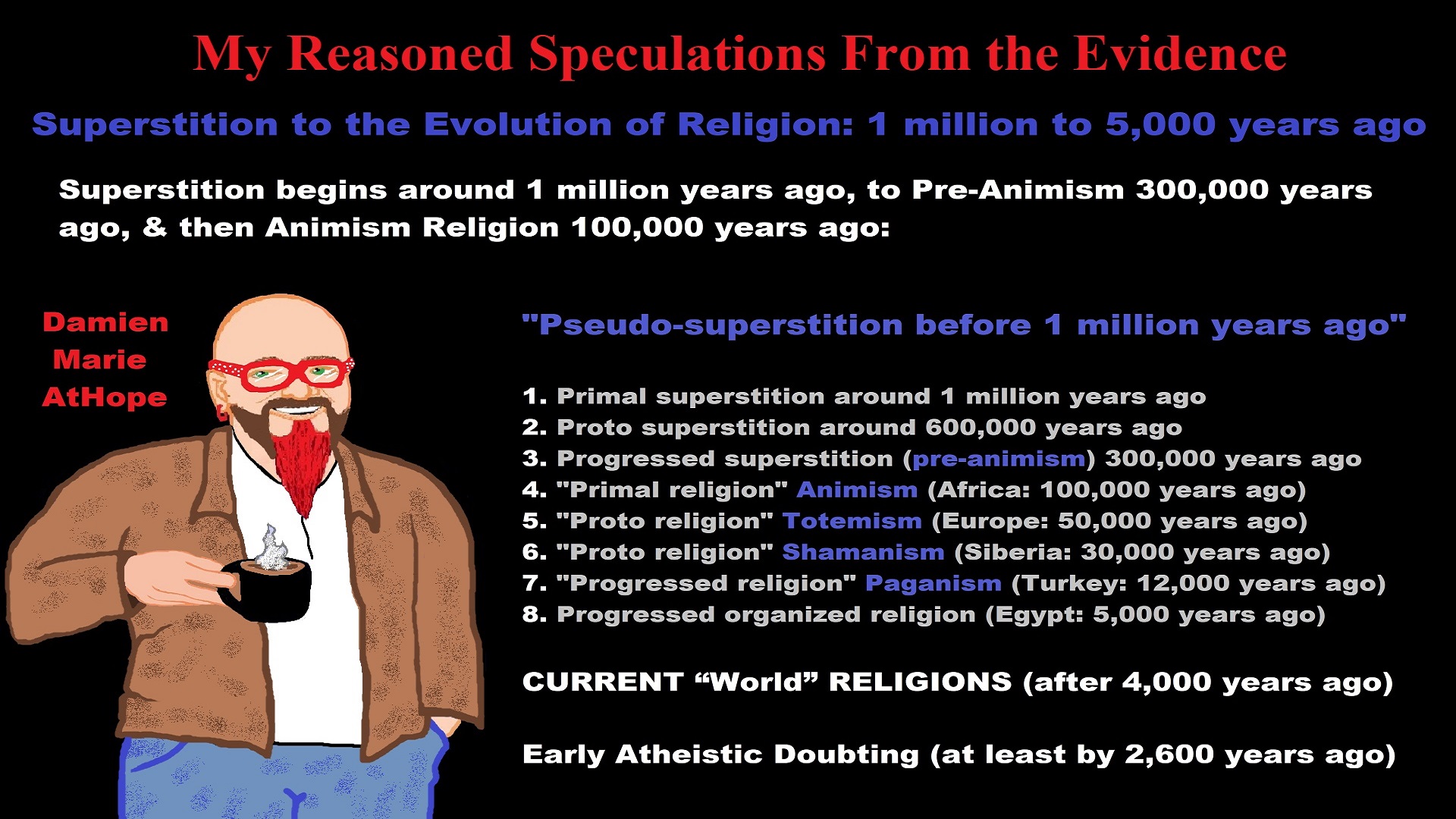
My thoughts on Religion Evolution with external links for more info:
- (Pre-Animism Africa mainly, but also Europe, and Asia at least 300,000 years ago), (Pre-Animism – Oxford Dictionaries)
- (Animism Africa around 100,000 years ago), (Animism – Britannica.com)
- (Totemism Europe around 50,000 years ago), (Totemism – Anthropology)
- (Shamanism Siberia around 30,000 years ago), (Shamanism – Britannica.com)
- (Paganism Turkey around 12,000 years ago), (Paganism – BBC Religion)
- (Progressed Organized Religion “Institutional Religion” Egypt around 5,000 years ago), (Ancient Egyptian Religion – Britannica.com)
- (CURRENT “World” RELIGIONS after 4,000 years ago) (Origin of Major Religions – Sacred Texts)
- (Early Atheistic Doubting at least by 2,600 years ago) (History of Atheism – Wikipedia)
“Religion is an Evolved Product” and Yes, Religion is Like Fear Given Wings…
Atheists talk about gods and religions for the same reason doctors talk about cancer, they are looking for a cure, or a firefighter talks about fires because they burn people and they care to stop them. We atheists too often feel a need to help the victims of mental slavery, held in the bondage that is the false beliefs of gods and the conspiracy theories of reality found in religions.
Understanding Religion Evolution:
- Pre-Animism (at least 300,000 years ago)
- Animism (Africa: 100,000 years ago)
- Totemism (Europe: 50,000 years ago)
- Shamanism (Siberia: 30,000 years ago)
- Paganism (Turkey: 12,000 years ago)
- Progressed organized religion (Egypt: 5,000 years ago), (Egypt, the First Dynasty 5,150 years ago)
- CURRENT “World” RELIGIONS (after 4,000 years ago)
- Early Atheistic Doubting (at least by 2,600 years ago)
“An Archaeological/Anthropological Understanding of Religion Evolution”
It seems ancient peoples had to survived amazing threats in a “dangerous universe (by superstition perceived as good and evil),” and human “immorality or imperfection of the soul” which was thought to affect the still living, leading to ancestor worship. This ancestor worship presumably led to the belief in supernatural beings, and then some of these were turned into the belief in gods. This feeble myth called gods were just a human conceived “made from nothing into something over and over, changing, again and again, taking on more as they evolve, all the while they are thought to be special,” but it is just supernatural animistic spirit-belief perceived as sacred.
Quick Evolution of Religion?
Pre-Animism (at least 300,000 years ago) pre-religion is a beginning that evolves into later Animism. So, Religion as we think of it, to me, all starts in a general way with Animism (Africa: 100,000 years ago) (theoretical belief in supernatural powers/spirits), then this is physically expressed in or with Totemism (Europe: 50,000 years ago) (theoretical belief in mythical relationship with powers/spirits through a totem item), which then enlists a full-time specific person to do this worship and believed interacting Shamanism (Siberia/Russia: 30,000 years ago) (theoretical belief in access and influence with spirits through ritual), and then there is the further employment of myths and gods added to all the above giving you Paganism (Turkey: 12,000 years ago) (often a lot more nature-based than most current top world religions, thus hinting to their close link to more ancient religious thinking it stems from). My hypothesis is expressed with an explanation of the building of a theatrical house (modern religions development). Progressed organized religion (Egypt: 5,000 years ago) with CURRENT “World” RELIGIONS (after 4,000 years ago).
Historically, in large city-state societies (such as Egypt or Iraq) starting around 5,000 years ago culminated to make religion something kind of new, a sociocultural-governmental-religious monarchy, where all or at least many of the people of such large city-state societies seem familiar with and committed to the existence of “religion” as the integrated life identity package of control dynamics with a fixed closed magical doctrine, but this juggernaut integrated religion identity package of Dogmatic-Propaganda certainly did not exist or if developed to an extent it was highly limited in most smaller prehistoric societies as they seem to lack most of the strong control dynamics with a fixed closed magical doctrine (magical beliefs could be at times be added or removed). Many people just want to see developed religious dynamics everywhere even if it is not. Instead, all that is found is largely fragments until the domestication of religion.
Religions, as we think of them today, are a new fad, even if they go back to around 6,000 years in the timeline of human existence, this amounts to almost nothing when seen in the long slow evolution of religion at least around 70,000 years ago with one of the oldest ritual worship. Stone Snake of South Africa: “first human worship” 70,000 years ago. This message of how religion and gods among them are clearly a man-made thing that was developed slowly as it was invented and then implemented peace by peace discrediting them all. Which seems to be a simple point some are just not grasping how devastating to any claims of truth when we can see the lie clearly in the archeological sites.
I wish people fought as hard for the actual values as they fight for the group/clan names political or otherwise they think support values. Every amount spent on war is theft to children in need of food or the homeless kept from shelter.
Here are several of my blog posts on history:
- To Find Truth You Must First Look
- (Magdalenian/Iberomaurusian) Connections to the First Paganists of the early Neolithic Near East Dating from around 17,000 to 12,000 Years Ago
- Natufians: an Ancient People at the Origins of Agriculture and Sedentary Life
- Possible Clan Leader/Special “MALE” Ancestor Totem Poles At Least 13,500 years ago?
- Jewish People with DNA at least 13,200 years old, Judaism, and the Origins of Some of its Ideas
- Baltic Reindeer Hunters: Swiderian, Lyngby, Ahrensburgian, and Krasnosillya cultures 12,020 to 11,020 years ago are evidence of powerful migratory waves during the last 13,000 years and a genetic link to Saami and the Finno-Ugric peoples.
- The Rise of Inequality: patriarchy and state hierarchy inequality
- Fertile Crescent 12,500 – 9,500 Years Ago: fertility and death cult belief system?
- 12,400 – 11,700 Years Ago – Kortik Tepe (Turkey) Pre/early-Agriculture Cultic Ritualism
- Ritualistic Bird Symbolism at Gobekli Tepe and its “Ancestor Cult”
- Male-Homosexual (female-like) / Trans-woman (female) Seated Figurine from Gobekli Tepe
- Could a 12,000-year-old Bull Geoglyph at Göbekli Tepe relate to older Bull and Female Art 25,000 years ago and Later Goddess and the Bull cults like Catal Huyuk?
- Sedentism and the Creation of goddesses around 12,000 years ago as well as male gods after 7,000 years ago.
- Alcohol, where Agriculture and Religion Become one? Such as Gobekli Tepe’s Ritualistic use of Grain as Food and Ritual Drink
- Neolithic Ritual Sites with T-Pillars and other Cultic Pillars
- Paganism: Goddesses around 12,000 years ago then Male Gods after 7,000 years ago
- First Patriarchy: Split of Women’s Status around 12,000 years ago & First Hierarchy: fall of Women’s Status around 5,000 years ago.
- Natufians: an Ancient People at the Origins of Agriculture and Sedentary Life
- J DNA and the Spread of Agricultural Religion (paganism)
- Paganism: an approximately 12,000-year-old belief system
- Paganism 12,000 years old: related to “Anarchism and Socialism” (Pre-Capitalism)
- Shaman burial in Israel 12,000 years ago and the Shamanism Phenomena
- Need to Mythicized: gods and goddesses
- 12,000 – 7,000 Years Ago – Paleo-Indian Culture (The Americas)
- 12,000 – 2,000 Years Ago – Indigenous-Scandinavians (Nordic)
- Norse did not wear helmets with horns?
- Pre-Pottery Neolithic Skull Cult around 11,500 to 8,400 Years Ago?
- 10,400 – 10,100 Years Ago, in Turkey the Nevail Cori Religious Settlement
- 9,000-6,500 Years Old Submerged Pre-Pottery/Pottery Neolithic Ritual Settlements off Israel’s Coast
- Catal Huyuk “first religious designed city” around 9,500 to 7,700 years ago (Turkey)
- Cultic Hunting at Catal Huyuk “first religious designed city”
- Special Items and Art as well as Special Elite Burials at Catal Huyuk
- New Rituals and Violence with the appearance of Pottery and People?
- Haplogroup N and its related Uralic Languages and Cultures
- Ainu people, Sámi people, Native Americans, the Ancient North Eurasians, and Paganistic-Shamanism with Totemism
- Ideas, Technology and People from Turkey, Europe, to China and Back again 9,000 to 5,000 years ago?
- First Pottery of Europe and the Related Cultures
- 9,000 years old Neolithic Artifacts Judean Desert and Hills Israel
- 9,000-7,000 years-old Sex and Death Rituals: Cult Sites in Israel, Jordan, and the Sinai
- 9,000-8500 year old Horned Female shaman Bad Dürrenberg Germany
- Neolithic Jewelry and the Spread of Farming in Europe Emerging out of West Turkey
- 8,600-year-old Tortoise Shells in Neolithic graves in central China have Early Writing and Shamanism
- Swing of the Mace: the rise of Elite, Forced Authority, and Inequality begin to Emerge 8,500 years ago?
- Migrations and Changing Europeans Beginning around 8,000 Years Ago
- My “Steppe-Anatolian-Kurgan hypothesis” 8,000/7,000 years ago
- Around 8,000-year-old Shared Idea of the Mistress of Animals, “Ritual” Motif
- Pre-Columbian Red-Paint (red ochre) Maritime Archaic Culture 8,000-3,000 years ago
- 7,522-6,522 years ago Linear Pottery culture which I think relates to Arcane Capitalism’s origins
- Arcane Capitalism: Primitive socialism, Primitive capital, Private ownership, Means of production, Market capitalism, Class discrimination, and Petite bourgeoisie (smaller capitalists)
- 7,500-4,750 years old Ritualistic Cucuteni-Trypillian culture of Moldova, Romania, and Ukraine
- Roots of a changing early society 7,200-6,700 years ago Jordan and Israel
- Agriculture religion (Paganism) with farming reached Britain between about 7,000 to 6,500 or so years ago and seemingly expressed in things like Western Europe’s Long Barrows
- My Thoughts on Possible Migrations of “R” DNA and Proto-Indo-European?
- “Millet” Spreading from China 7,022 years ago to Europe and related Language may have Spread with it leading to Proto-Indo-European
- Proto-Indo-European (PIE), ancestor of Indo-European languages: DNA, Society, Language, and Mythology
- The Dnieper–Donets culture and Asian varieties of Millet from China to the Black Sea region of Europe by 7,022 years ago
- Kurgan 6,000 years ago/dolmens 7,000 years ago: funeral, ritual, and other?
- 7,020 to 6,020-year-old Proto-Indo-European Homeland of Urheimat or proposed home of their Language and Religion
- Ancient Megaliths: Kurgan, Ziggurat, Pyramid, Menhir, Trilithon, Dolman, Kromlech, and Kromlech of Trilithons
- The Mytheme of Ancient North Eurasian Sacred-Dog belief and similar motifs are found in Indo-European, Native American, and Siberian comparative mythology
- Elite Power Accumulation: Ancient Trade, Tokens, Writing, Wealth, Merchants, and Priest-Kings
- Sacred Mounds, Mountains, Kurgans, and Pyramids may hold deep connections?
- Between 7,000-5,000 Years ago, rise of unequal hierarchy elite, leading to a “birth of the State” or worship of power, strong new sexism, oppression of non-elites, and the fall of Women’s equal status
- Paganism 7,000-5,000 years old: related to “Anarchism and Socialism” (Capitalism) (World War 0) Elite & their slaves
- Hell and Underworld mythologies starting maybe as far back as 7,000 to 5,000 years ago with the Proto-Indo-Europeans?
- The First Expression of the Male God around 7,000 years ago?
- White (light complexion skin) Bigotry and Sexism started 7,000 years ago?
- Around 7,000-year-old Shared Idea of the Divine Bird (Tutelary and/or Trickster spirit/deity), “Ritual” Motif
- Nekhbet an Ancient Egyptian Vulture Goddess and Tutelary Deity
- 6,720 to 4,920 years old Ritualistic Hongshan Culture of Inner Mongolia with 5,000-year-old Pyramid Mounds and Temples
- First proto-king in the Balkans, Varna culture around 6,500 years ago?
- 6,500–5,800 years ago in Israel Late Chalcolithic (Copper Age) Period in the Southern Levant Seems to Express Northern Levant Migrations, Cultural and Religious Transfer
- KING OF BEASTS: Master of Animals “Ritual” Motif, around 6,000 years old or older…
- Around 6000-year-old Shared Idea of the Solid Wheel & the Spoked Wheel-Shaped Ritual Motif
- “The Ghassulian Star,” a mysterious 6,000-year-old mural from Jordan; a Proto-Star of Ishtar, Star of Inanna or Star of Venus?
- Religious/Ritual Ideas, including goddesses and gods as well as ritual mounds or pyramids from Northeastern Asia at least 6,000 years old, seemingly filtering to Iran, Iraq, the Mediterranean, Europe, Egypt, and the Americas?
- Maykop (5,720–5,020 years ago) Caucasus region Bronze Age culture-related to Copper Age farmers from the south, influenced by the Ubaid period and Leyla-Tepe culture, as well as influencing the Kura-Araxes culture
- 5-600-year-old Tomb, Mummy, and First Bearded Male Figurine in a Grave
- Kura-Araxes Cultural 5,520 to 4,470 years old DNA traces to the Canaanites, Arabs, and Jews
- Minoan/Cretan (Keftiu) Civilization and Religion around 5,520 to 3,120 years ago
- Evolution Of Science at least by 5,500 years ago
- 5,500 Years old birth of the State, the rise of Hierarchy, and the fall of Women’s status
- “Jiroft culture” 5,100 – 4,200 years ago and the History of Iran
- Stonehenge: Paganistic Burial and Astrological Ritual Complex, England (5,100-3,600 years ago)
- Around 5,000-year-old Shared Idea of the “Tree of Life” Ritual Motif
- Complex rituals for elite, seen from China to Egypt, at least by 5,000 years ago
- Around 5,000 years ago: “Birth of the State” where Religion gets Military Power and Influence
- The Center of the World “Axis Mundi” and/or “Sacred Mountains” Mythology Could Relate to the Altai Mountains, Heart of the Steppe
- Progressed organized religion starts, an approximately 5,000-year-old belief system
- China’s Civilization between 5,000-3,000 years ago, was a time of war and class struggle, violent transition from free clans to a Slave or Elite society
- Origin of Logics is Naturalistic Observation at least by around 5,000 years ago.
- Paganism 5,000 years old: progressed organized religion and the state: related to “Anarchism and Socialism” (Kings and the Rise of the State)
- Ziggurats (multi-platform temples: 4,900 years old) to Pyramids (multi-platform tombs: 4,700 years old)
- Did a 4,520–4,420-year-old Volcano In Turkey Inspire the Bible God?
- Finland’s Horned Shaman and Pre-Horned-God at least 4,500 years ago?
- 4,000-year-Old Dolmens in Israel: A Connected Dolmen Religious Phenomenon?
- Creation myths: From chaos, Ex nihilo, Earth-diver, Emergence, World egg, and World parent
- Bronze Age “Ritual” connections of the Bell Beaker culture with the Corded Ware/Single Grave culture, which were related to the Yamnaya culture and Proto-Indo-European Languages/Religions
- Low Gods (Earth/ Tutelary deity), High Gods (Sky/Supreme deity), and Moralistic Gods (Deity enforcement/divine order)
- The exchange of people, ideas, and material-culture including, to me, the new god (Sky Father) and goddess (Earth Mother) religion between the Cucuteni-Trypillians and others which is then spread far and wide
- Koryaks: Indigenous People of the Russian Far East and Big Raven myths also found in Tlingit, Haida, Tsimshian, and other Indigenous People of North America
- 42 Principles Of Maat (Egyptian Goddess of the justice) around 4,400 years ago, 2000 Years Before Ten Commandments
- “Happy Easter” Well Happy Eostre/Ishter
- 4,320-3,820 years old “Shimao” (North China) site with Totemistic-Shamanistic Paganism and a Stepped Pyramid
- 4,250 to 3,400 Year old Stonehenge from Russia: Arkaim?
- 4,100-year-old beaker with medicinal & flowering plants in a grave of a woman in Scotland
- Early European Farmer ancestry, Kelif el Boroud people with the Cardial Ware culture, and the Bell Beaker culture Paganists too, spread into North Africa, then to the Canary Islands off West Africa
- Flood Accounts: Gilgamesh epic (4,100 years ago) Noah in Genesis (2,600 years ago)
- Paganism 4,000 years old: related to “Anarchism and Socialism” (First Moralistic gods, then the Origin time of Monotheism)
- When was the beginning: TIMELINE OF CURRENT RELIGIONS, which start around 4,000 years ago.
- Early Religions Thought to Express Proto-Monotheistic Systems around 4,000 years ago
- Kultepe? An archaeological site with a 4,000 years old women’s rights document.
- Single God Religions (Monotheism) = “Man-o-theism” started around 4,000 years ago with the Great Sky Spirit/God Tiān (天)?
- Confucianism’s Tiān (Shangdi god 4,000 years old): Supernaturalism, Pantheism or Theism?
- Yes, Your Male God is Ridiculous
- Mythology, a Lunar Deity is a Goddess or God of the Moon
- Sacred Land, Hills, and Mountains: Sami Mythology (Paganistic Shamanism)
- Horse Worship/Sacrifice: mythical union of Ruling Elite/Kingship and the Horse
- The Amorite/Amurru people’s God Amurru “Lord of the Steppe”, relates to the Origins of the Bible God?
- Bronze Age Exotic Trade Routes Spread Quite Far as well as Spread Religious Ideas with Them
- Sami and the Northern Indigenous Peoples Landscape, Language, and its Connection to Religion
- Prototype of Ancient Analemmatic Sundials around 3,900-3,150 years ago and a Possible Solar Connection to gods?
- Judaism is around 3,450 or 3,250 years old. (“Paleo-Hebrew” 3,000 years ago and Torah 2,500 years ago)
- The Weakening of Ancient Trade and the Strengthening of Religions around 3000 years ago?
- Are you aware that there are religions that worship women gods, explain now religion tears women down?
- Animistic, Totemistic, and Paganistic Superstition Origins of bible god and the bible’s Religion.
- Myths and Folklore: “Trickster gods and goddesses”
- Jews, Judaism, and the Origins of Some of its Ideas
- An Old Branch of Religion Still Giving Fruit: Sacred Trees
- Dating the BIBLE: naming names and telling times (written less than 3,000 years ago, provable to 2,200 years ago)
- Did a Volcano Inspire the bible god?
- Dené–Yeniseian language, Old Copper Complex, and Pre-Columbian Mound Builders?
- No “dinosaurs and humans didn’t exist together just because some think they are in the bible itself”
- Sacred Shit and Sacred Animals?
- Everyone Killed in the Bible Flood? “Nephilim” (giants)?
- Hey, Damien dude, I have a question for you regarding “the bible” Exodus.
- Archaeology Disproves the Bible
- Bible Battle, Just More, Bible Babble
- The Jericho Conquest lie?
- Canaanites and Israelites?
- Accurate Account on how did Christianity Began?
- Let’s talk about Christianity.
- So the 10 commandments isn’t anything to go by either right?
- Misinformed christian
- Debunking Jesus?
- Paulism vs Jesus
- Ok, you seem confused so let’s talk about Buddhism.
- Unacknowledged Buddhism: Gods, Savior, Demons, Rebirth, Heavens, Hells, and Terrorism
- His Foolishness The Dalai Lama
- Yin and Yang is sexist with an ORIGIN around 2,300 years ago?
- I Believe Archaeology, not Myths & Why Not, as the Religious Myths Already Violate Reason!
- Archaeological, Scientific, & Philosophic evidence shows the god myth is man-made nonsense.
- Aquatic Ape Theory/Hypothesis? As Always, Just Pseudoscience.
- Ancient Aliens Conspiracy Theorists are Pseudohistorians
- The Pseudohistoric and Pseudoscientific claims about “Bakoni Ruins” of South Africa
- Why do people think Religion is much more than supernaturalism and superstitionism?
- Religion is an Evolved Product
- Was the Value of Ancient Women Different?
- 1000 to 1100 CE, human sacrifice Cahokia Mounds a pre-Columbian Native American site
- Feminist atheists as far back as the 1800s?
- Promoting Religion as Real is Mentally Harmful to a Flourishing Humanity
- Screw All Religions and Their Toxic lies, they are all fraud
- Forget Religions’ Unfounded Myths, I Have Substantiated “Archaeology Facts.”
- Religion Dispersal throughout the World
- I Hate Religion Just as I Hate all Pseudoscience
- Exposing Scientology, Eckankar, Wicca and Other Nonsense?
- Main deity or religious belief systems
- Quit Trying to Invent Your God From the Scraps of Science.
- Archaeological, Scientific, & Philosophic evidence shows the god myth is man-made nonsense.
- Ancient Alien Conspiracy Theorists: Misunderstanding, Rhetoric, Misinformation, Fabrications, and Lies
- Misinformation, Distortion, and Pseudoscience in Talking with a Christian Creationist
- Judging the Lack of Goodness in Gods, Even the Norse God Odin
- Challenging the Belief in God-like Aliens and Gods in General
- A Challenge to Christian use of Torture Devices?
- Yes, Hinduism is a Religion
- Trump is One of the Most Reactionary Forces of Far-right Christian Extremism
- Was the Bull Head a Symbol of God? Yes!
- Primate Death Rituals
- Christian – “God and Christianity are objectively true”
- Australopithecus afarensis Death Ritual?
- You Claim Global Warming is a Hoax?
- Doubter of Science and Defamer of Atheists?
- I think that sounds like the Bible?
- History of the Antifa (“anti-fascist”) Movements
- Indianapolis Anti-Blasphemy Laws #Free Soheil Rally
- Damien, you repeat the golden rule in so many forms then you say religion is dogmatic?
- Science is a Trustable Methodology whereas Faith is not Trustable at all!
- Was I ever a believer, before I was an atheist?
- Atheists rise in reason
- Mistrust of science?
- Open to Talking About the Definition of ‘God’? But first, we address Faith.
- ‘United Monarchy’ full of splendor and power – Saul, David, and Solomon? Most likely not.
- Is there EXODUS ARCHAEOLOGY? The short answer is “no.”
- Lacking Proof of Bigfoots, Unicorns, and Gods is Just a Lack of Research?
- Religion and Politics: Faith Beliefs vs. Rational Thinking
- Hammer of Truth that lying pig RELIGION: challenged by an archaeologist
- “The Hammer of Truth” -ontology question- What do You Mean by That?
- Navigation of a bad argument: Ad Hominem vs. Attack
- Why is it Often Claimed that Gods have a Gender?
- Why are basically all monotheistic religions ones that have a male god?
- Shifting through the Claims in support of Faith
- Dear Mr. AtHope, The 20th Century is an Indictment of Secularism and a Failed Atheist Century
- An Understanding of the Worldwide Statistics and Dynamics of Terrorist Incidents and Suicide Attacks
- Intoxication and Evolution? Addressing and Assessing the “Stoned Ape” or “Drunken Monkey” Theories as Catalysts in Human Evolution
- Sacred Menstrual cloth? Inanna’s knot, Isis knot, and maybe Ma’at’s feather?
- Damien, why don’t the Hebrews accept the bible stories?
- Dealing with a Troll and Arguing Over Word Meaning
- Knowledge without Belief? Justified beliefs or disbeliefs worthy of Knowledge?
- Afrocentrism and African Religions
- Crecganford @crecganford offers history & stories of the people, places, gods, & culture
- Empiricism-Denier?
I am not an academic. I am a revolutionary that teaches in public, in places like social media, and in the streets. I am not a leader by some title given but from my commanding leadership style of simply to start teaching everywhere to everyone, all manner of positive education.

Not all “Religions” or “Religious Persuasions” have a god(s) but
All can be said to believe in some imaginary beings or imaginary things like spirits, afterlives, etc.

Paganism 12,000-4,000 years old
12,000-7,000 years old: related to (Pre-Capitalism)
7,000-5,000 years old: related to (Capitalism) (World War 0) Elite and their slaves!
5,000 years old: related to (Kings and the Rise of the State)
4,000 years old: related to (First Moralistic gods, then the Origin time of Monotheism)

ref, ref, ref, ref, ref, ref, ref, ref, ref, ref, ref, ref, ref, ref, ref, ref, ref, ref, ref, ref, ref
Low Gods “Earth” or Tutelary deity and High Gods “Sky” or Supreme deity
“An Earth goddess is a deification of the Earth. Earth goddesses are often associated with the “chthonic” deities of the underworld. Ki and Ninhursag are Mesopotamian earth goddesses. In Greek mythology, the Earth is personified as Gaia, corresponding to Roman Terra, Indic Prithvi/Bhūmi, etc. traced to an “Earth Mother” complementary to the “Sky Father” in Proto-Indo-European religion. Egyptian mythology exceptionally has a sky goddess and an Earth god.” ref
“A mother goddess is a goddess who represents or is a personification of nature, motherhood, fertility, creation, destruction or who embodies the bounty of the Earth. When equated with the Earth or the natural world, such goddesses are sometimes referred to as Mother Earth or as the Earth Mother. In some religious traditions or movements, Heavenly Mother (also referred to as Mother in Heaven or Sky Mother) is the wife or feminine counterpart of the Sky father or God the Father.” ref
“Any masculine sky god is often also king of the gods, taking the position of patriarch within a pantheon. Such king gods are collectively categorized as “sky father” deities, with a polarity between sky and earth often being expressed by pairing a “sky father” god with an “earth mother” goddess (pairings of a sky mother with an earth father are less frequent). A main sky goddess is often the queen of the gods and may be an air/sky goddess in her own right, though she usually has other functions as well with “sky” not being her main. In antiquity, several sky goddesses in ancient Egypt, Mesopotamia, and the Near East were called Queen of Heaven. Neopagans often apply it with impunity to sky goddesses from other regions who were never associated with the term historically. The sky often has important religious significance. Many religions, both polytheistic and monotheistic, have deities associated with the sky.” ref
“In comparative mythology, sky father is a term for a recurring concept in polytheistic religions of a sky god who is addressed as a “father”, often the father of a pantheon and is often either a reigning or former King of the Gods. The concept of “sky father” may also be taken to include Sun gods with similar characteristics, such as Ra. The concept is complementary to an “earth mother“. “Sky Father” is a direct translation of the Vedic Dyaus Pita, etymologically descended from the same Proto-Indo-European deity name as the Greek Zeûs Pater and Roman Jupiter and Germanic Týr, Tir or Tiwaz, all of which are reflexes of the same Proto-Indo-European deity’s name, *Dyēus Ph₂tḗr. While there are numerous parallels adduced from outside of Indo-European mythology, there are exceptions (e.g. In Egyptian mythology, Nut is the sky mother and Geb is the earth father).” ref
Tutelary deity
“A tutelary (also tutelar) is a deity or spirit who is a guardian, patron, or protector of a particular place, geographic feature, person, lineage, nation, culture, or occupation. The etymology of “tutelary” expresses the concept of safety and thus of guardianship. In late Greek and Roman religion, one type of tutelary deity, the genius, functions as the personal deity or daimon of an individual from birth to death. Another form of personal tutelary spirit is the familiar spirit of European folklore.” ref
“A tutelary (also tutelar) in Korean shamanism, jangseung and sotdae were placed at the edge of villages to frighten off demons. They were also worshiped as deities. Seonangshin is the patron deity of the village in Korean tradition and was believed to embody the Seonangdang. In Philippine animism, Diwata or Lambana are deities or spirits that inhabit sacred places like mountains and mounds and serve as guardians. Such as: Maria Makiling is the deity who guards Mt. Makiling and Maria Cacao and Maria Sinukuan. In Shinto, the spirits, or kami, which give life to human bodies come from nature and return to it after death. Ancestors are therefore themselves tutelaries to be worshiped. And similarly, Native American beliefs such as Tonás, tutelary animal spirit among the Zapotec and Totems, familial or clan spirits among the Ojibwe, can be animals.” ref
“A tutelary (also tutelar) in Austronesian beliefs such as: Atua (gods and spirits of the Polynesian peoples such as the Māori or the Hawaiians), Hanitu (Bunun of Taiwan‘s term for spirit), Hyang (Kawi, Sundanese, Javanese, and Balinese Supreme Being, in ancient Java and Bali mythology and this spiritual entity, can be either divine or ancestral), Kaitiaki (New Zealand Māori term used for the concept of guardianship, for the sky, the sea, and the land), Kawas (mythology) (divided into 6 groups: gods, ancestors, souls of the living, spirits of living things, spirits of lifeless objects, and ghosts), Tiki (Māori mythology, Tiki is the first man created by either Tūmatauenga or Tāne and represents deified ancestors found in most Polynesian cultures). ” ref, ref, ref, ref, ref, ref, ref
Mesopotamian Tutelary Deities can be seen as ones related to City-States
“Historical city-states included Sumerian cities such as Uruk and Ur; Ancient Egyptian city-states, such as Thebes and Memphis; the Phoenician cities (such as Tyre and Sidon); the five Philistine city-states; the Berber city-states of the Garamantes; the city-states of ancient Greece (the poleis such as Athens, Sparta, Thebes, and Corinth); the Roman Republic (which grew from a city-state into a vast empire); the Italian city-states from the Middle Ages to the early modern period, such as Florence, Siena, Ferrara, Milan (which as they grew in power began to dominate neighboring cities) and Genoa and Venice, which became powerful thalassocracies; the Mayan and other cultures of pre-Columbian Mesoamerica (including cities such as Chichen Itza, Tikal, Copán and Monte Albán); the central Asian cities along the Silk Road; the city-states of the Swahili coast; Ragusa; states of the medieval Russian lands such as Novgorod and Pskov; and many others.” ref
“The Uruk period (ca. 4000 to 3100 BCE; also known as Protoliterate period) of Mesopotamia, named after the Sumerian city of Uruk, this period saw the emergence of urban life in Mesopotamia and the Sumerian civilization. City-States like Uruk and others had a patron tutelary City Deity along with a Priest-King.” ref
“Chinese folk religion, both past, and present, includes myriad tutelary deities. Exceptional individuals, highly cultivated sages, and prominent ancestors can be deified and honored after death. Lord Guan is the patron of military personnel and police, while Mazu is the patron of fishermen and sailors. Such as Tu Di Gong (Earth Deity) is the tutelary deity of a locality, and each individual locality has its own Earth Deity and Cheng Huang Gong (City God) is the guardian deity of an individual city, worshipped by local officials and locals since imperial times.” ref
“A tutelary (also tutelar) in Hinduism, personal tutelary deities are known as ishta-devata, while family tutelary deities are known as Kuladevata. Gramadevata are guardian deities of villages. Devas can also be seen as tutelary. Shiva is the patron of yogis and renunciants. City goddesses include: Mumbadevi (Mumbai), Sachchika (Osian); Kuladevis include: Ambika (Porwad), and Mahalakshmi. In NorthEast India Meitei mythology and religion (Sanamahism) of Manipur, there are various types of tutelary deities, among which Lam Lais are the most predominant ones. Tibetan Buddhism has Yidam as a tutelary deity. Dakini is the patron of those who seek knowledge.” ref
“A tutelary (also tutelar) The Greeks also thought deities guarded specific places: for instance, Athena was the patron goddess of the city of Athens. Socrates spoke of hearing the voice of his personal spirit or daimonion:
You have often heard me speak of an oracle or sign which comes to me … . This sign I have had ever since I was a child. The sign is a voice which comes to me and always forbids me to do something which I am going to do, but never commands me to do anything, and this is what stands in the way of my being a politician.” ref
“Tutelary deities who guard and preserve a place or a person are fundamental to ancient Roman religion. The tutelary deity of a man was his Genius, that of a woman her Juno. In the Imperial era, the Genius of the Emperor was a focus of Imperial cult. An emperor might also adopt a major deity as his personal patron or tutelary, as Augustus did Apollo. Precedents for claiming the personal protection of a deity were established in the Republican era, when for instance the Roman dictator Sulla advertised the goddess Victory as his tutelary by holding public games (ludi) in her honor.” ref
“Each town or city had one or more tutelary deities, whose protection was considered particularly vital in time of war and siege. Rome itself was protected by a goddess whose name was to be kept ritually secret on pain of death (for a supposed case, see Quintus Valerius Soranus). The Capitoline Triad of Juno, Jupiter, and Minerva were also tutelaries of Rome. The Italic towns had their own tutelary deities. Juno often had this function, as at the Latin town of Lanuvium and the Etruscan city of Veii, and was often housed in an especially grand temple on the arx (citadel) or other prominent or central location. The tutelary deity of Praeneste was Fortuna, whose oracle was renowned.” ref
“The Roman ritual of evocatio was premised on the belief that a town could be made vulnerable to military defeat if the power of its tutelary deity were diverted outside the city, perhaps by the offer of superior cult at Rome. The depiction of some goddesses such as the Magna Mater (Great Mother, or Cybele) as “tower-crowned” represents their capacity to preserve the city. A town in the provinces might adopt a deity from within the Roman religious sphere to serve as its guardian, or syncretize its own tutelary with such; for instance, a community within the civitas of the Remi in Gaul adopted Apollo as its tutelary, and at the capital of the Remi (present-day Rheims), the tutelary was Mars Camulus.” ref
Household deity (a kind of or related to a Tutelary deity)
“A household deity is a deity or spirit that protects the home, looking after the entire household or certain key members. It has been a common belief in paganism as well as in folklore across many parts of the world. Household deities fit into two types; firstly, a specific deity – typically a goddess – often referred to as a hearth goddess or domestic goddess who is associated with the home and hearth, such as the ancient Greek Hestia.” ref
“The second type of household deities are those that are not one singular deity, but a type, or species of animistic deity, who usually have lesser powers than major deities. This type was common in the religions of antiquity, such as the Lares of ancient Roman religion, the Gashin of Korean shamanism, and Cofgodas of Anglo-Saxon paganism. These survived Christianisation as fairy-like creatures existing in folklore, such as the Anglo-Scottish Brownie and Slavic Domovoy.” ref
“Household deities were usually worshipped not in temples but in the home, where they would be represented by small idols (such as the teraphim of the Bible, often translated as “household gods” in Genesis 31:19 for example), amulets, paintings, or reliefs. They could also be found on domestic objects, such as cosmetic articles in the case of Tawaret. The more prosperous houses might have a small shrine to the household god(s); the lararium served this purpose in the case of the Romans. The gods would be treated as members of the family and invited to join in meals, or be given offerings of food and drink.” ref
“In many religions, both ancient and modern, a god would preside over the home. Certain species, or types, of household deities, existed. An example of this was the Roman Lares. Many European cultures retained house spirits into the modern period. Some examples of these include:
- Brownie (Scotland and England) or Hob (England) / Kobold (Germany) / Goblin / Hobgoblin
- Domovoy (Slavic)
- Nisse (Norwegian or Danish) / Tomte (Swedish) / Tonttu (Finnish)
- Húsvættir (Norse)” ref
“Although the cosmic status of household deities was not as lofty as that of the Twelve Olympians or the Aesir, they were also jealous of their dignity and also had to be appeased with shrines and offerings, however humble. Because of their immediacy they had arguably more influence on the day-to-day affairs of men than the remote gods did. Vestiges of their worship persisted long after Christianity and other major religions extirpated nearly every trace of the major pagan pantheons. Elements of the practice can be seen even today, with Christian accretions, where statues to various saints (such as St. Francis) protect gardens and grottos. Even the gargoyles found on older churches, could be viewed as guardians partitioning a sacred space.” ref
“For centuries, Christianity fought a mop-up war against these lingering minor pagan deities, but they proved tenacious. For example, Martin Luther‘s Tischreden have numerous – quite serious – references to dealing with kobolds. Eventually, rationalism and the Industrial Revolution threatened to erase most of these minor deities, until the advent of romantic nationalism rehabilitated them and embellished them into objects of literary curiosity in the 19th century. Since the 20th century this literature has been mined for characters for role-playing games, video games, and other fantasy personae, not infrequently invested with invented traits and hierarchies somewhat different from their mythological and folkloric roots.” ref
“In contradistinction to both Herbert Spencer and Edward Burnett Tylor, who defended theories of animistic origins of ancestor worship, Émile Durkheim saw its origin in totemism. In reality, this distinction is somewhat academic, since totemism may be regarded as a particularized manifestation of animism, and something of a synthesis of the two positions was attempted by Sigmund Freud. In Freud’s Totem and Taboo, both totem and taboo are outward expressions or manifestations of the same psychological tendency, a concept which is complementary to, or which rather reconciles, the apparent conflict. Freud preferred to emphasize the psychoanalytic implications of the reification of metaphysical forces, but with particular emphasis on its familial nature. This emphasis underscores, rather than weakens, the ancestral component.” ref
“William Edward Hearn, a noted classicist, and jurist, traced the origin of domestic deities from the earliest stages as an expression of animism, a belief system thought to have existed also in the neolithic, and the forerunner of Indo-European religion. In his analysis of the Indo-European household, in Chapter II “The House Spirit”, Section 1, he states:
The belief which guided the conduct of our forefathers was … the spirit rule of dead ancestors.” ref
“In Section 2 he proceeds to elaborate:
It is thus certain that the worship of deceased ancestors is a vera causa, and not a mere hypothesis. …
In the other European nations, the Slavs, the Teutons, and the Kelts, the House Spirit appears with no less distinctness. … [T]he existence of that worship does not admit of doubt. … The House Spirits had a multitude of other names which it is needless here to enumerate, but all of which are more or less expressive of their friendly relations with man. … In [England] … [h]e is the Brownie. … In Scotland this same Brownie is well known. He is usually described as attached to particular families, with whom he has been known to reside for centuries, threshing the corn, cleaning the house, and performing similar household tasks. His favorite gratification was milk and honey.” ref

ref, ref, ref, ref, ref, ref, ref, ref, ref, ref, ref, ref, ref, ref, ref, ref, ref
“These ideas are my speculations from the evidence.”
I am still researching the “god‘s origins” all over the world. So you know, it is very complicated but I am smart and willing to look, DEEP, if necessary, which going very deep does seem to be needed here, when trying to actually understand the evolution of gods and goddesses. I am sure of a few things and less sure of others, but even in stuff I am not fully grasping I still am slowly figuring it out, to explain it to others. But as I research more I am understanding things a little better, though I am still working on understanding it all or something close and thus always figuring out more.
Sky Father/Sky God?
“Egyptian: (Nut) Sky Mother and (Geb) Earth Father” (Egypt is different but similar)
Turkic/Mongolic: (Tengri/Tenger Etseg) Sky Father and (Eje/Gazar Eej) Earth Mother *Transeurasian*
Hawaiian: (Wākea) Sky Father and (Papahānaumoku) Earth Mother *Austronesian*
New Zealand/ Māori: (Ranginui) Sky Father and (Papatūānuku) Earth Mother *Austronesian*
Proto-Indo-European: (Dyḗus/Dyḗus ph₂tḗr) Sky Father and (Dʰéǵʰōm/Pleth₂wih₁) Earth Mother
Indo-Aryan: (Dyaus Pita) Sky Father and (Prithvi Mata) Earth Mother *Indo-European*
Italic: (Jupiter) Sky Father and (Juno) Sky Mother *Indo-European*
Etruscan: (Tinia) Sky Father and (Uni) Sky Mother *Tyrsenian/Italy Pre–Indo-European*
Hellenic/Greek: (Zeus) Sky Father and (Hera) Sky Mother who started as an “Earth Goddess” *Indo-European*
Nordic: (Dagr) Sky Father and (Nótt) Sky Mother *Indo-European*
Slavic: (Perun) Sky Father and (Mokosh) Earth Mother *Indo-European*
Illyrian: (Deipaturos) Sky Father and (Messapic Damatura’s “earth-mother” maybe) Earth Mother *Indo-European*
Albanian: (Zojz) Sky Father and (?) *Indo-European*
Baltic: (Perkūnas) Sky Father and (Saulė) Sky Mother *Indo-European*
Germanic: (Týr) Sky Father and (?) *Indo-European*
Colombian-Muisca: (Bochica) Sky Father and (Huythaca) Sky Mother *Chibchan*
Aztec: (Quetzalcoatl) Sky Father and (Xochiquetzal) Sky Mother *Uto-Aztecan*
Incan: (Viracocha) Sky Father and (Mama Runtucaya) Sky Mother *Quechuan*
China: (Tian/Shangdi) Sky Father and (Dì) Earth Mother *Sino-Tibetan*
Sumerian, Assyrian and Babylonian: (An/Anu) Sky Father and (Ki) Earth Mother
Finnish: (Ukko) Sky Father and (Akka) Earth Mother *Finno-Ugric*
Sami: (Horagalles) Sky Father and (Ravdna) Earth Mother *Finno-Ugric*
Puebloan-Zuni: (Ápoyan Ta’chu) Sky Father and (Áwitelin Tsíta) Earth Mother
Puebloan-Hopi: (Tawa) Sky Father and (Kokyangwuti/Spider Woman/Grandmother) Earth Mother *Uto-Aztecan*
Puebloan-Navajo: (Tsohanoai) Sky Father and (Estsanatlehi) Earth Mother *Na-Dene*
ref, ref, ref, ref, ref, ref, ref, ref, ref, ref, ref, ref, ref, ref, ref, ref, ref, ref, ref, ref, ref, ref, ref, ref, ref, ref, ref
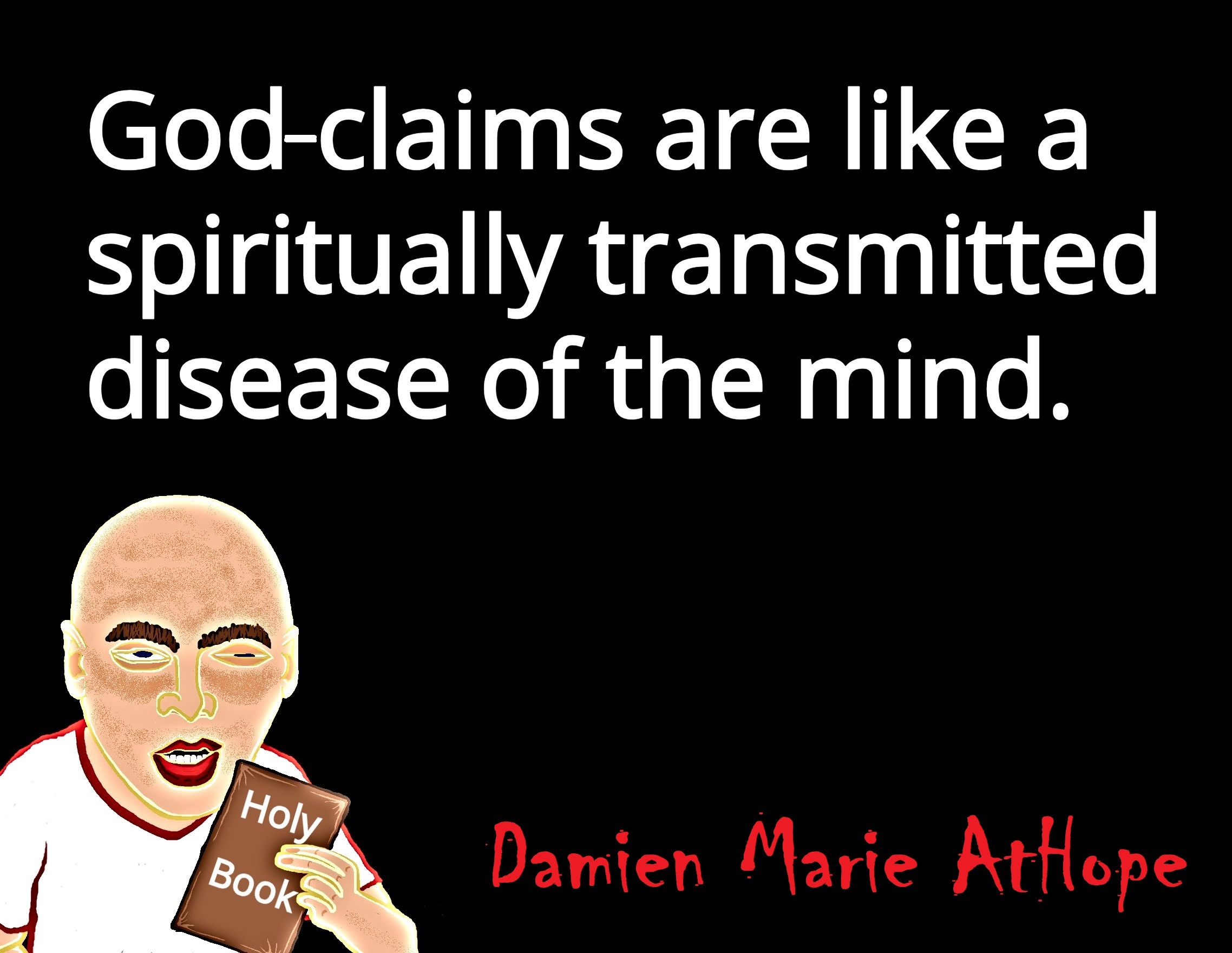
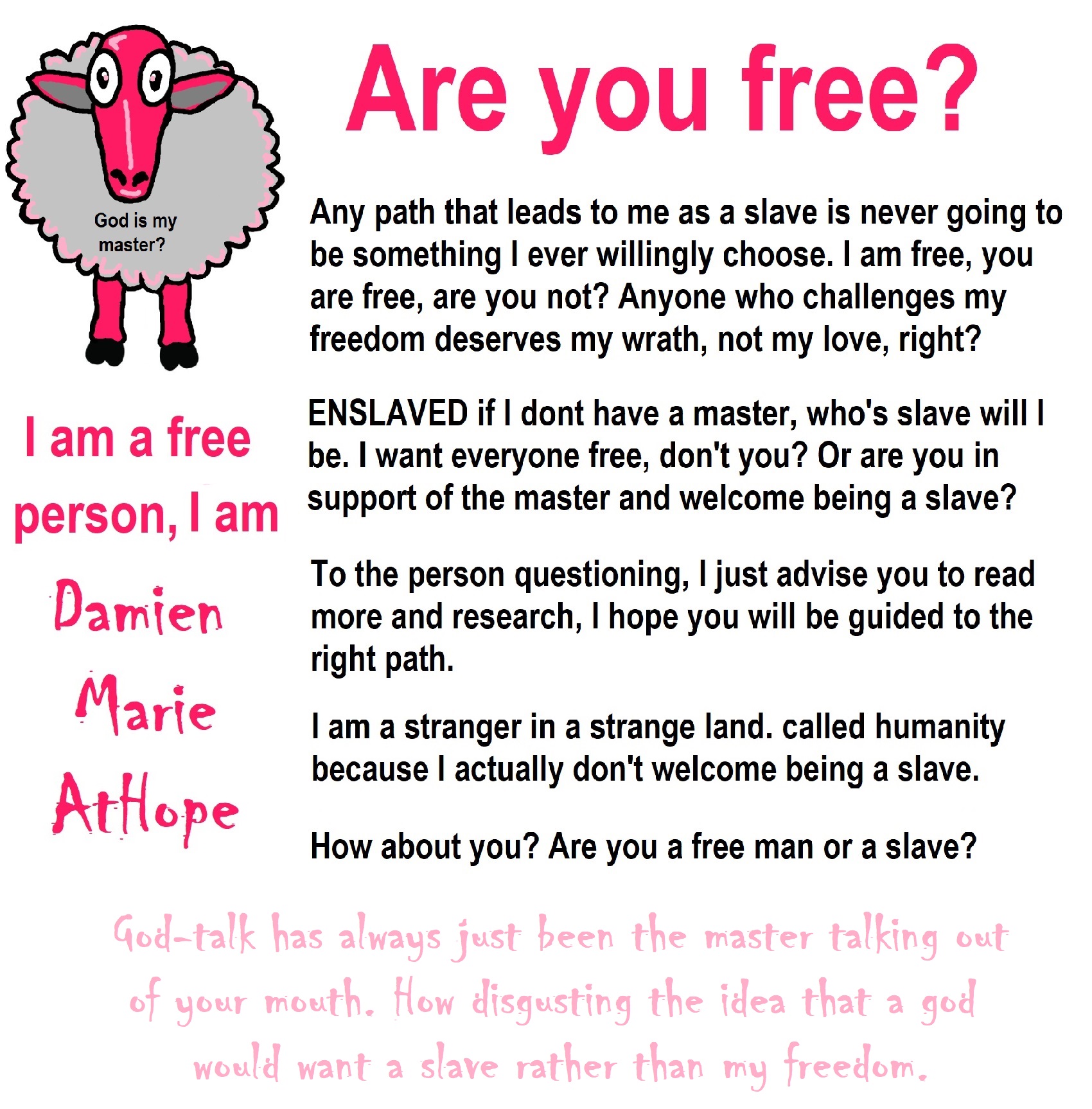

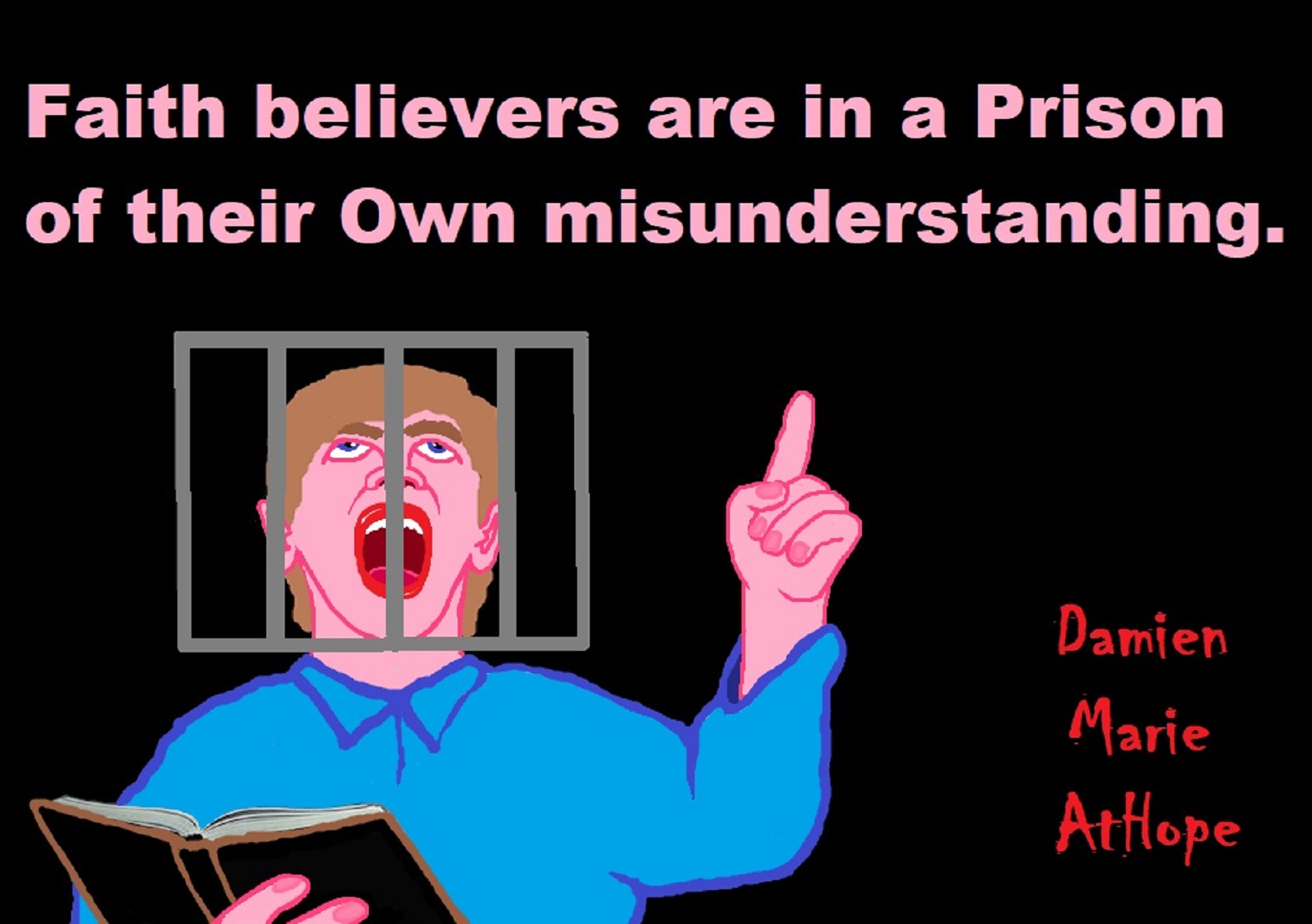
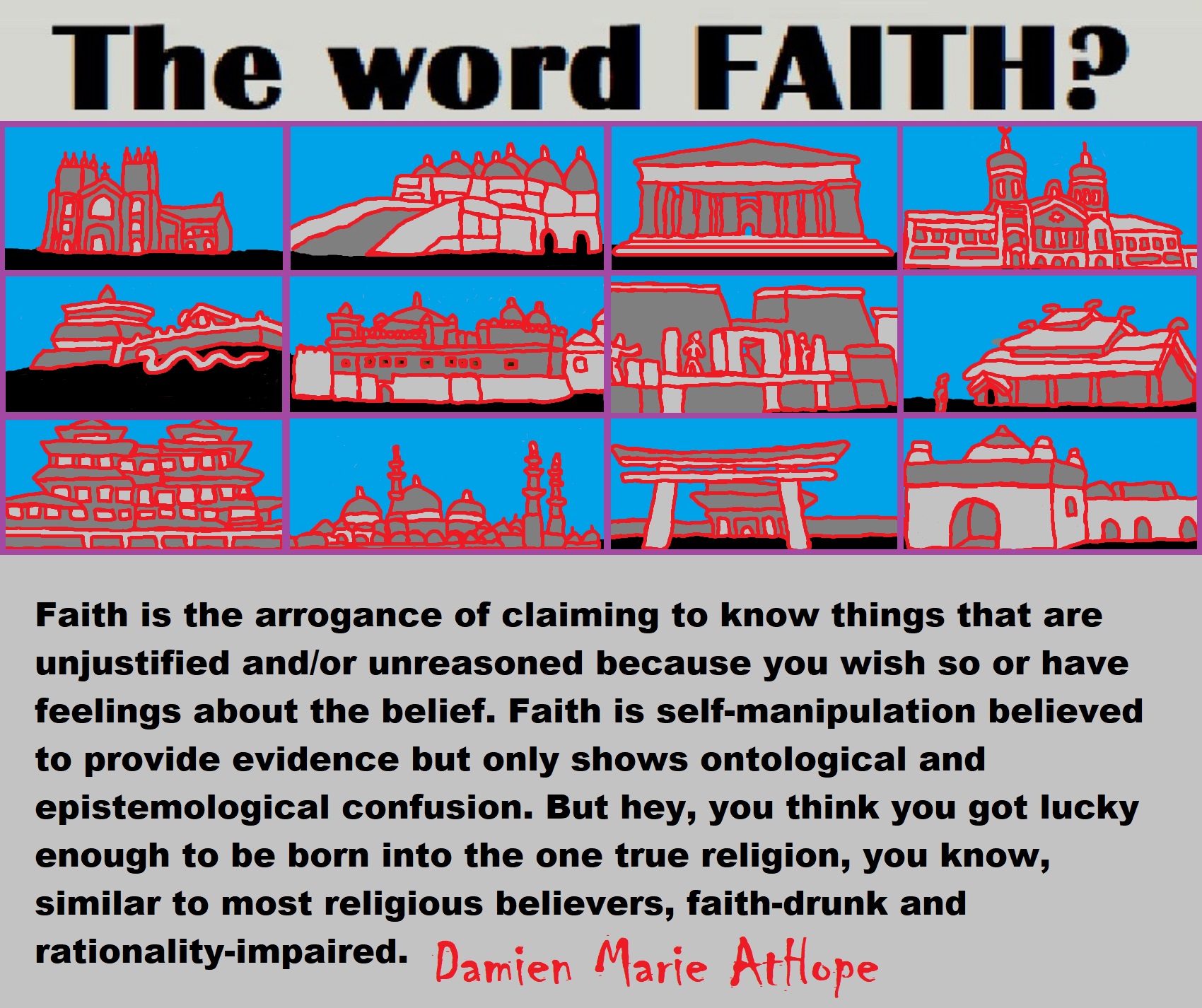
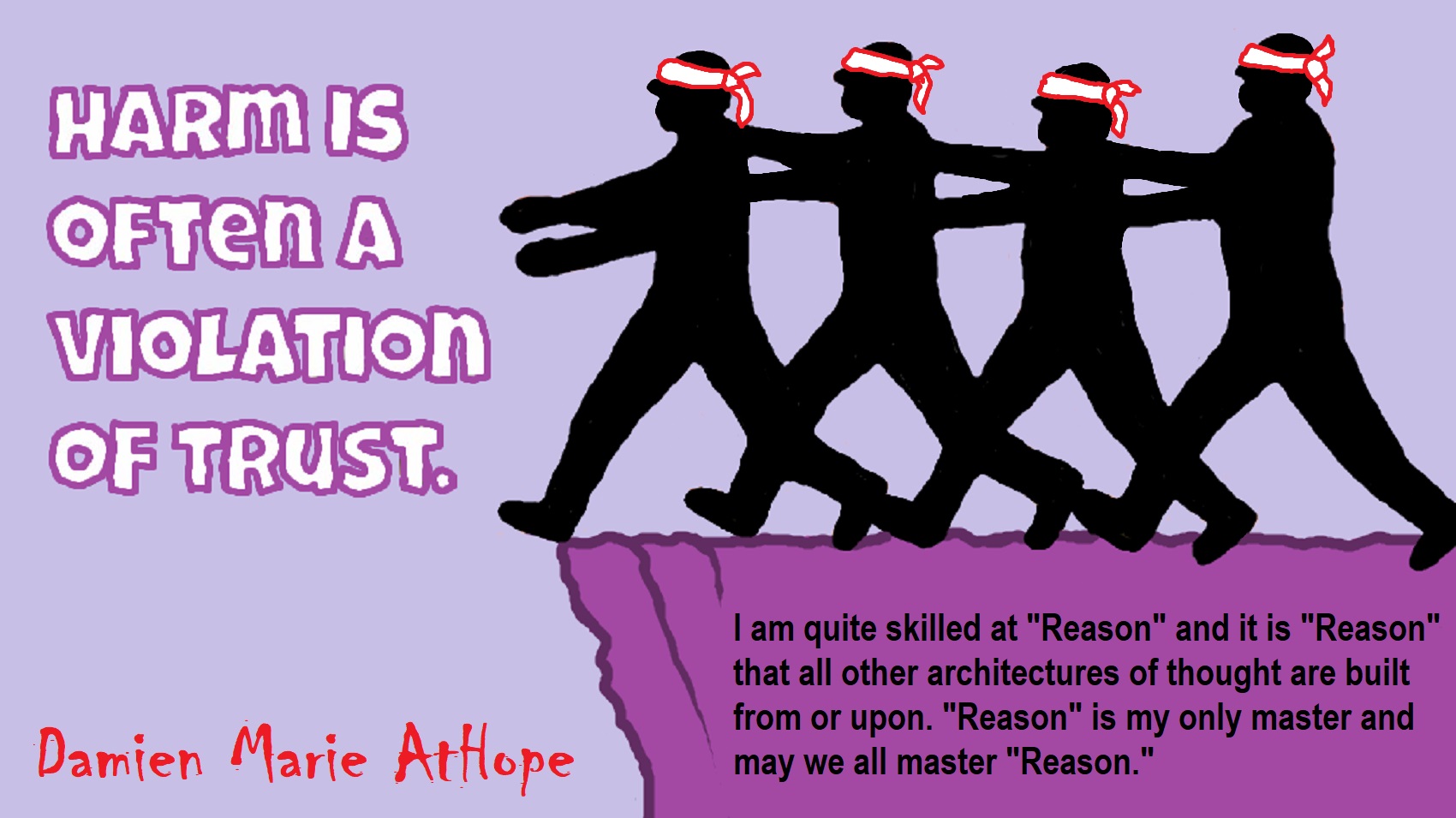
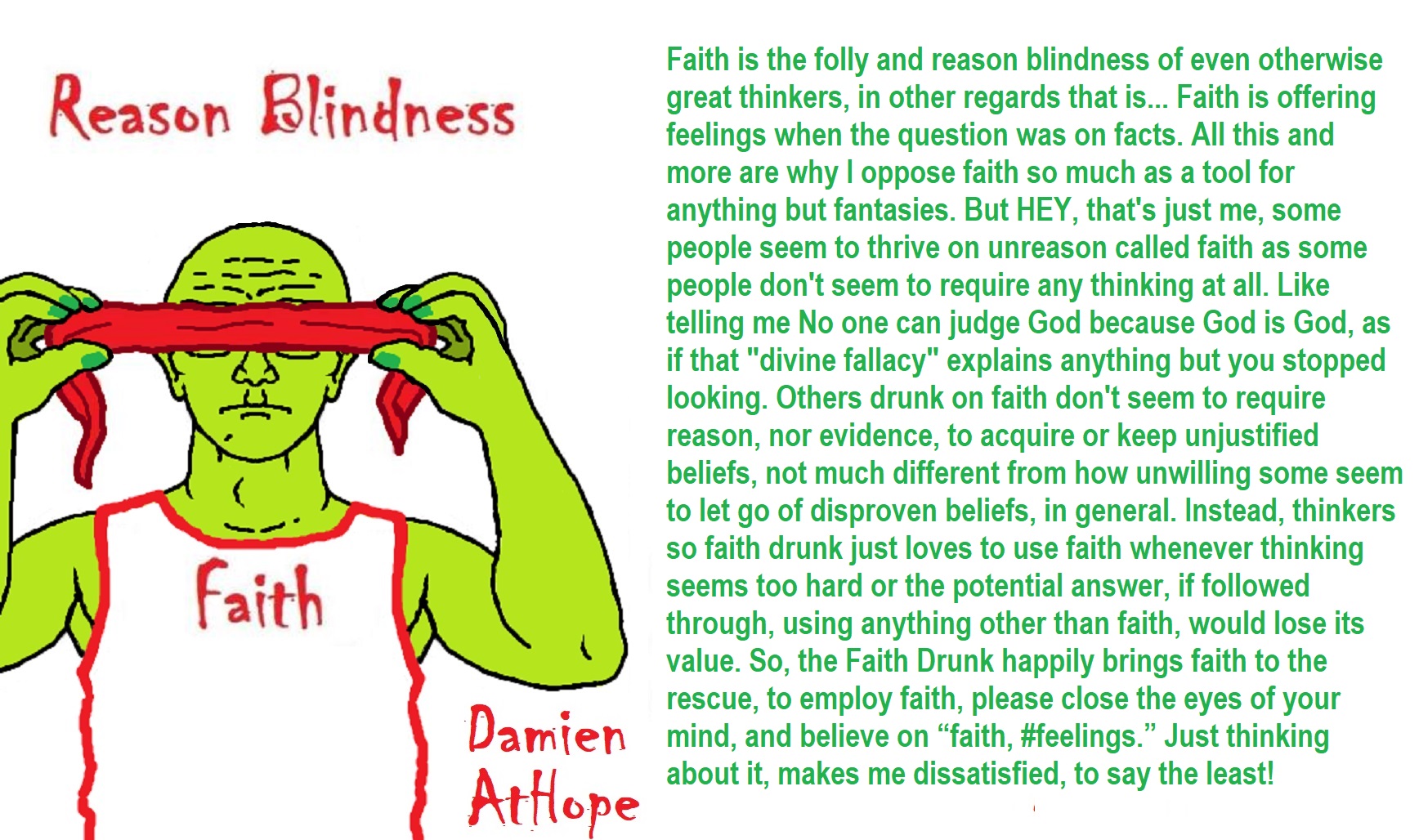
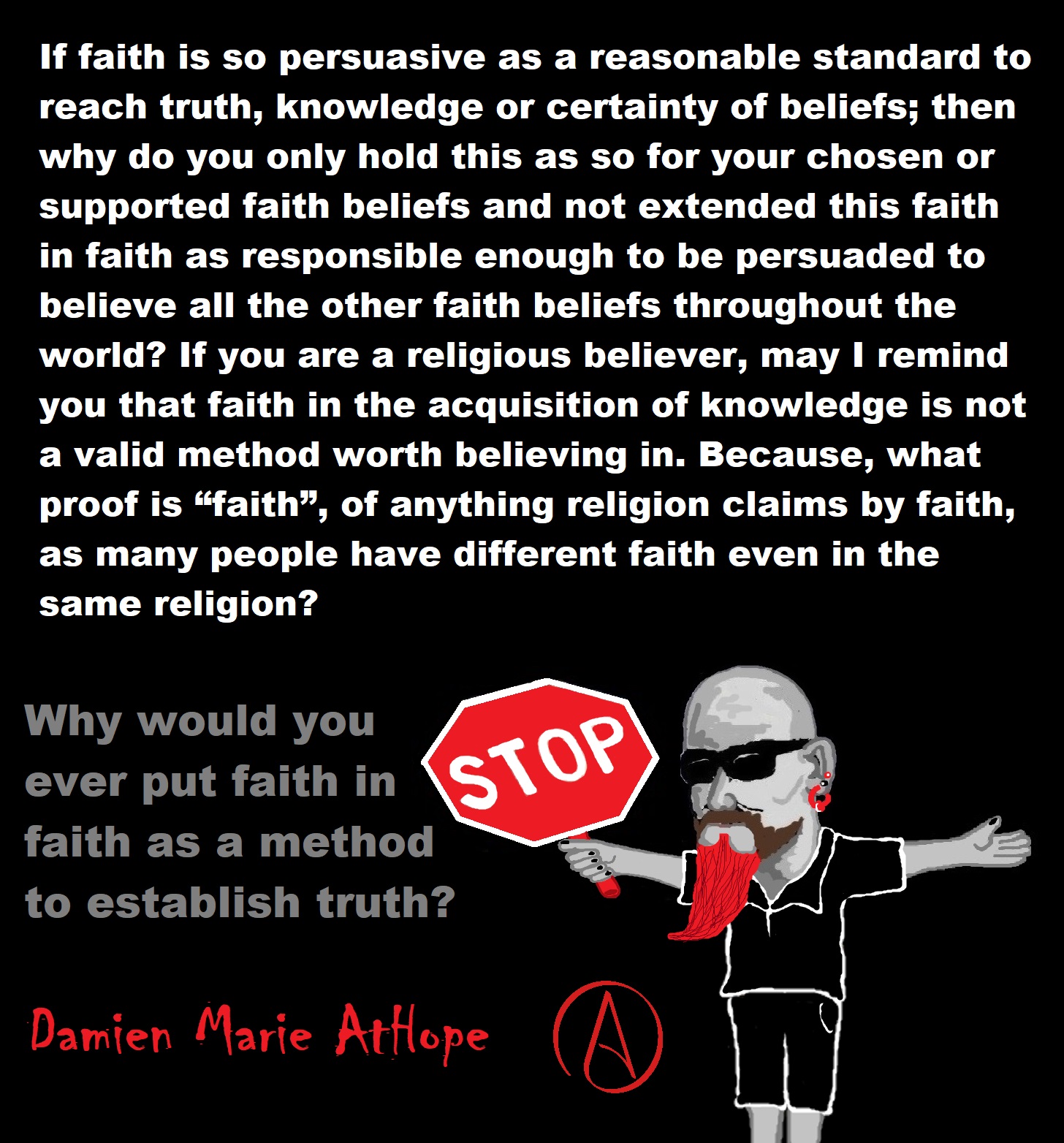
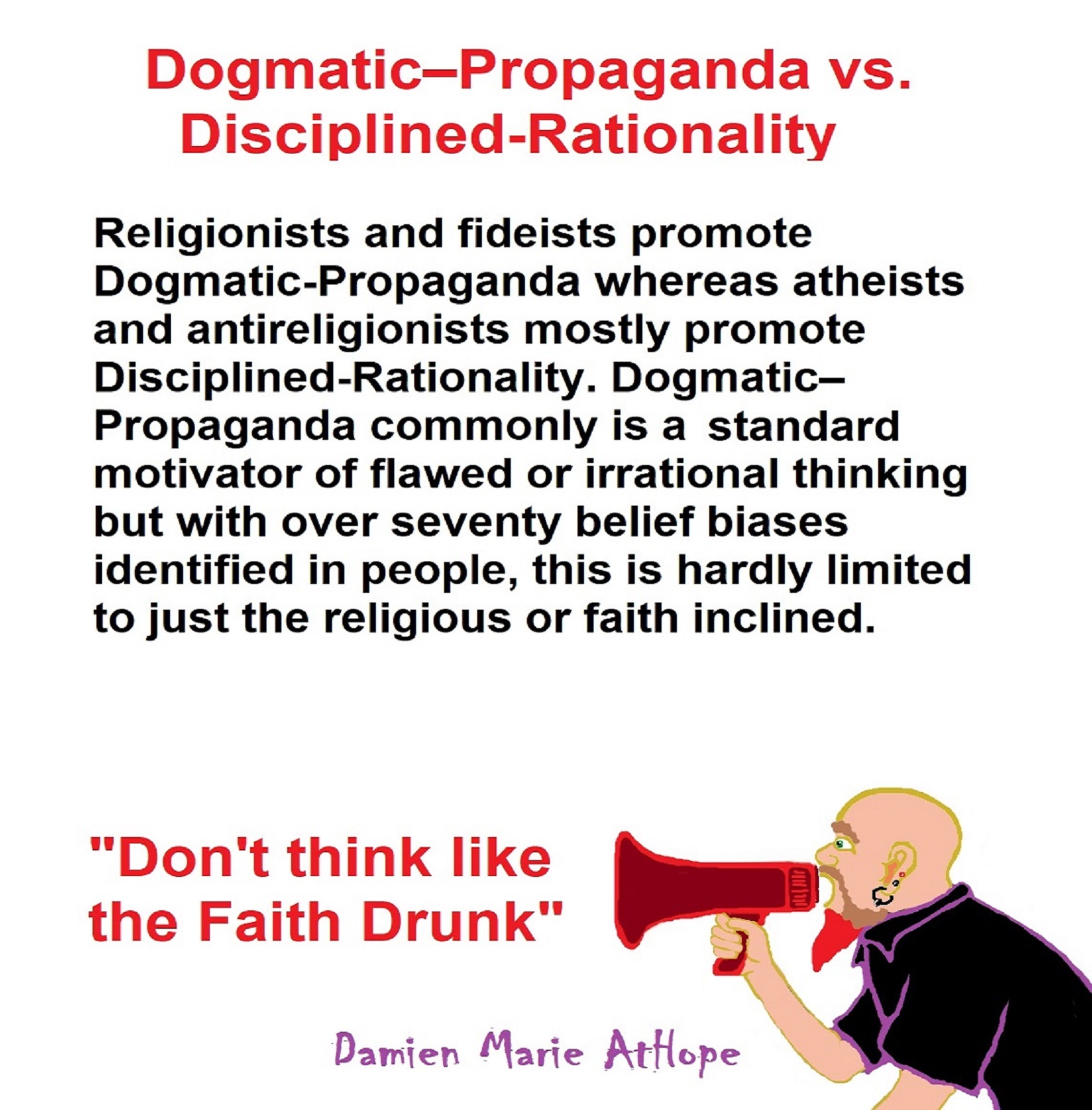
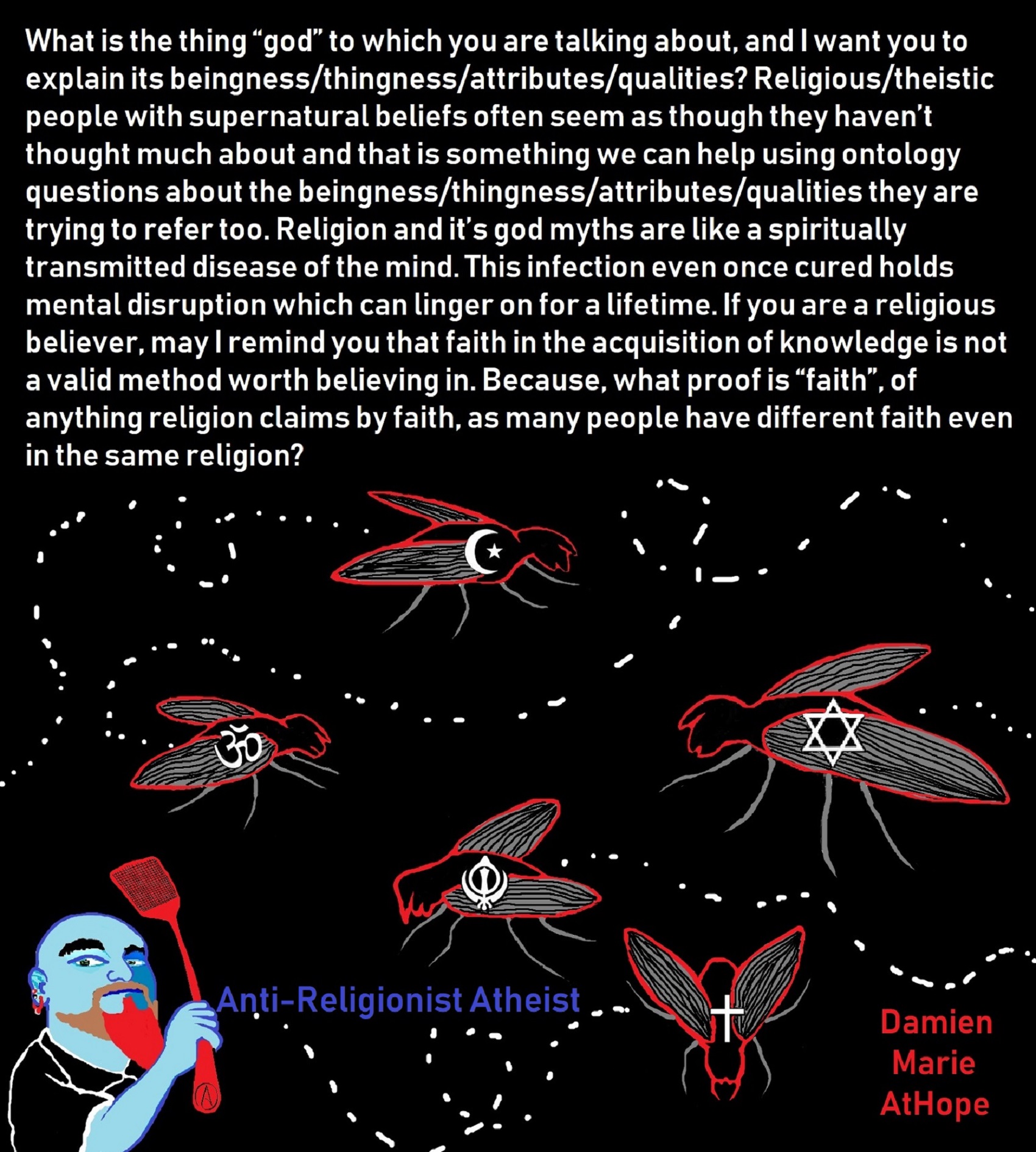
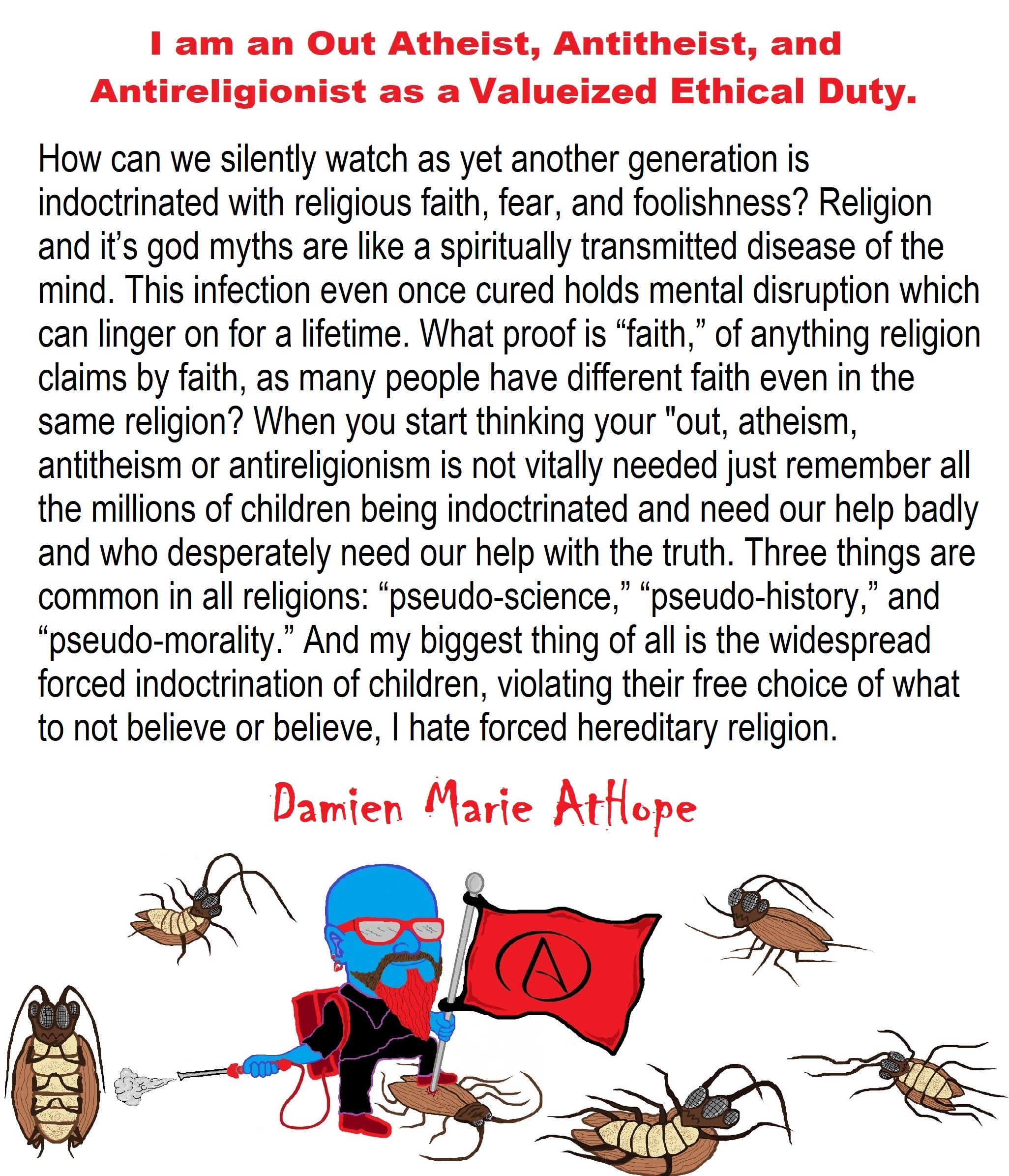
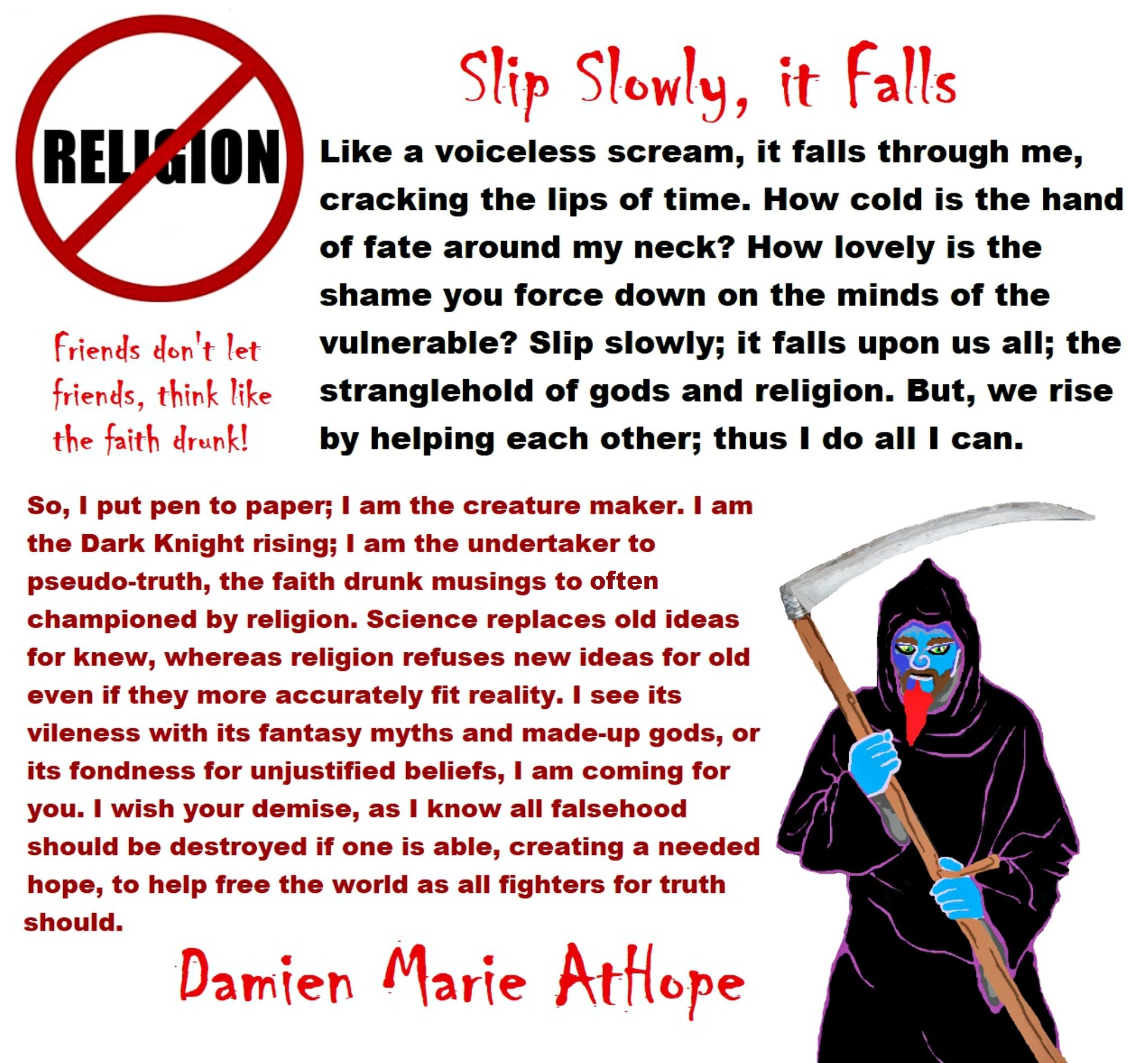
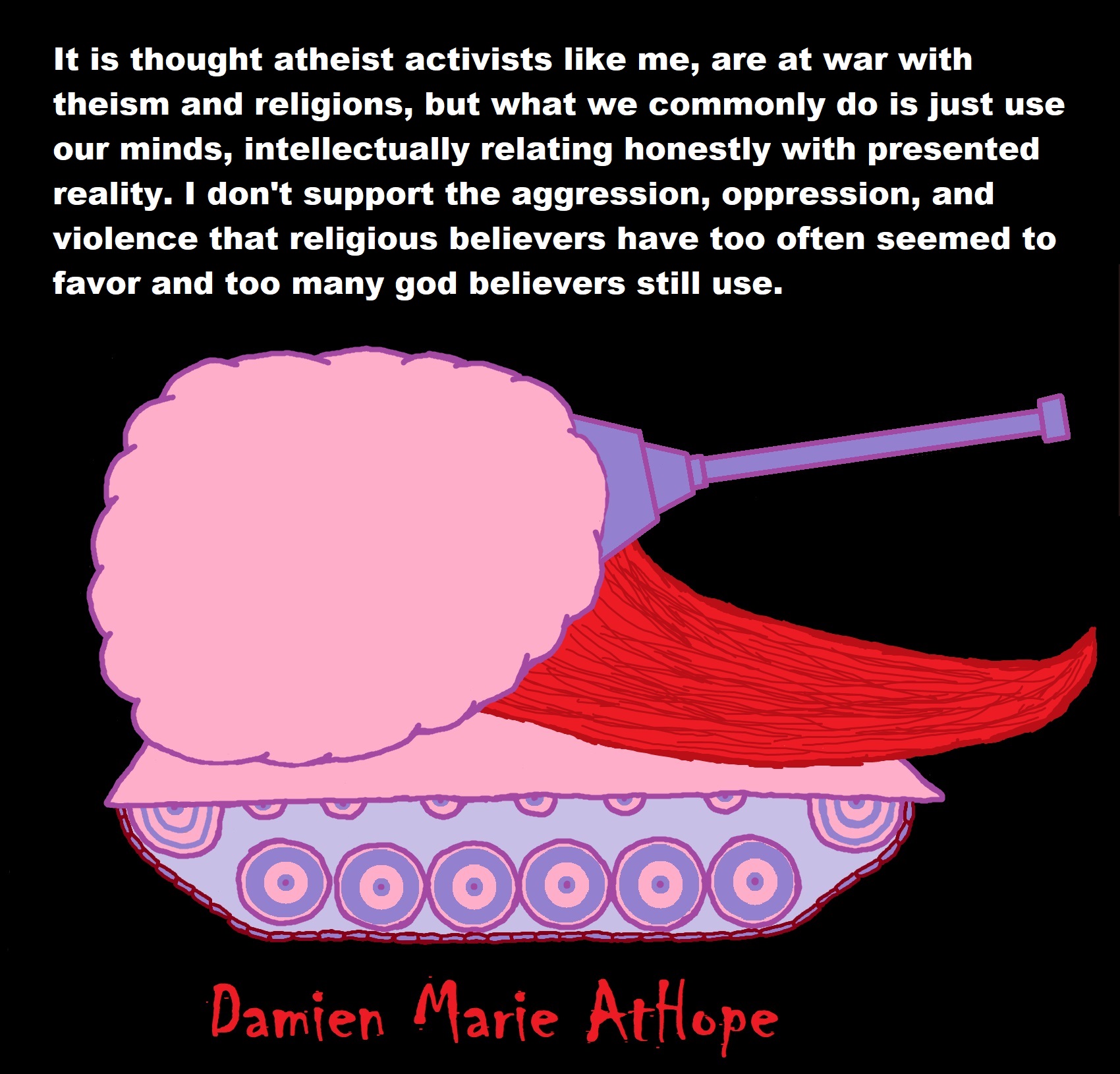



“Theists, there has to be a god, as something can not come from nothing.”
Well, thus something (unknown) happened and then there was something. This does not tell us what the something that may have been involved with something coming from nothing. A supposed first cause, thus something (unknown) happened and then there was something is not an open invitation to claim it as known, neither is it justified to call or label such an unknown as anything, especially an unsubstantiated magical thinking belief born of mythology and religious storytelling.

While hallucinogens are associated with shamanism, it is alcohol that is associated with paganism.
The Atheist-Humanist-Leftist Revolutionaries Shows in the prehistory series:
Show two: Pre-animism 300,000 years old and animism 100,000 years old: related to “Anarchism and Socialism”
Show tree: Totemism 50,000 years old: related to “Anarchism and Socialism”
Show four: Shamanism 30,000 years old: related to “Anarchism and Socialism”
Show five: Paganism 12,000 years old: related to “Anarchism and Socialism”
Show six: Emergence of hierarchy, sexism, slavery, and the new male god dominance: Paganism 7,000-5,000 years old: related to “Anarchism and Socialism” (Capitalism) (World War 0) Elite and their slaves!
Prehistory: related to “Anarchism and Socialism” the division of labor, power, rights, and recourses: VIDEO
Pre-animism 300,000 years old and animism 100,000 years old: related to “Anarchism and Socialism”: VIDEO
Totemism 50,000 years old: related to “Anarchism and Socialism”: VIDEO
Shamanism 30,000 years old: related to “Anarchism and Socialism”: VIDEO
Paganism 12,000 years old: related to “Anarchism and Socialism” (Pre-Capitalism): VIDEO
Paganism 7,000-5,000 years old: related to “Anarchism and Socialism” (Capitalism) (World War 0) Elite and their slaves: VIEDO
Paganism 5,000 years old: progressed organized religion and the state: related to “Anarchism and Socialism” (Kings and the Rise of the State): VIEDO
Paganism 4,000 years old: related to “Anarchism and Socialism” (First Moralistic gods, then the Origin time of Monotheism): VIEDO
I do not hate simply because I challenge and expose myths or lies any more than others being thought of as loving simply because of the protection and hiding from challenge their favored myths or lies.
The truth is best championed in the sunlight of challenge.
An archaeologist once said to me “Damien religion and culture are very different”
My response, So are you saying that was always that way, such as would you say Native Americans’ cultures are separate from their religions? And do you think it always was the way you believe?
I had said that religion was a cultural product. That is still how I see it and there are other archaeologists that think close to me as well. Gods too are the myths of cultures that did not understand science or the world around them, seeing magic/supernatural everywhere.
I personally think there is a goddess and not enough evidence to support a male god at Çatalhöyük but if there was both a male and female god and goddess then I know the kind of gods they were like Proto-Indo-European mythology.
This series idea was addressed in, Anarchist Teaching as Free Public Education or Free Education in the Public: VIDEO
Our 12 video series: Organized Oppression: Mesopotamian State Force and the Politics of power (9,000-4,000 years ago), is adapted from: The Complete and Concise History of the Sumerians and Early Bronze Age Mesopotamia (7000-2000 BC): https://www.youtube.com/watch?v=szFjxmY7jQA by “History with Cy“
Show #1: Mesopotamian State Force and the Politics of Power (Samarra, Halaf, Ubaid)
Show #2: Mesopotamian State Force and the Politics of Power
Show #3: Mesopotamian State Force and the Politics of Power (Uruk and the First Cities)
Show #4: Mesopotamian State Force and the Politics of Power (First Kings)
Show #5: Mesopotamian State Force and the Politics of Power (Early Dynastic Period)
Show #6: Mesopotamian State Force and the Politics of Power
Show #7: Mesopotamian State Force and the Politics of Power (Sargon and Akkadian Rule)
Show #9: Mesopotamian State Force and the Politics of Power (Gudea of Lagash and Utu-hegal)
Show #12: Mesopotamian State Force and the Politics of Power (Aftermath and Legacy of Sumer)

The “Atheist-Humanist-Leftist Revolutionaries”
Cory Johnston ☭ Ⓐ Atheist Leftist @Skepticallefty & I (Damien Marie AtHope) @AthopeMarie (my YouTube & related blog) are working jointly in atheist, antitheist, antireligionist, antifascist, anarchist, socialist, and humanist endeavors in our videos together, generally, every other Saturday.
Why Does Power Bring Responsibility?
Think, how often is it the powerless that start wars, oppress others, or commit genocide? So, I guess the question is to us all, to ask, how can power not carry responsibility in a humanity concept? I know I see the deep ethical responsibility that if there is power their must be a humanistic responsibility of ethical and empathic stewardship of that power. Will I be brave enough to be kind? Will I possess enough courage to be compassionate? Will my valor reach its height of empathy? I as everyone, earns our justified respect by our actions, that are good, ethical, just, protecting, and kind. Do I have enough self-respect to put my love for humanity’s flushing, over being brought down by some of its bad actors? May we all be the ones doing good actions in the world, to help human flourishing.
I create the world I want to live in, striving for flourishing. Which is not a place but a positive potential involvement and promotion; a life of humanist goal precision. To master oneself, also means mastering positive prosocial behaviors needed for human flourishing. I may have lost a god myth as an atheist, but I am happy to tell you, my friend, it is exactly because of that, leaving the mental terrorizer, god belief, that I truly regained my connected ethical as well as kind humanity.
Cory and I will talk about prehistory and theism, addressing the relevance to atheism, anarchism, and socialism.
At the same time as the rise of the male god, 7,000 years ago, there was also the very time there was the rise of violence, war, and clans to kingdoms, then empires, then states. It is all connected back to 7,000 years ago, and it moved across the world.
Cory Johnston: https://damienmarieathope.com/2021/04/cory-johnston-mind-of-a-skeptical-leftist/?v=32aec8db952d
The Mind of a Skeptical Leftist (YouTube)
Cory Johnston: Mind of a Skeptical Leftist @Skepticallefty
The Mind of a Skeptical Leftist By Cory Johnston: “Promoting critical thinking, social justice, and left-wing politics by covering current events and talking to a variety of people. Cory Johnston has been thoughtfully talking to people and attempting to promote critical thinking, social justice, and left-wing politics.” http://anchor.fm/skepticalleft
Cory needs our support. We rise by helping each other.
Cory Johnston ☭ Ⓐ @Skepticallefty Evidence-based atheist leftist (he/him) Producer, host, and co-host of 4 podcasts @skeptarchy @skpoliticspod and @AthopeMarie
Damien Marie AtHope (“At Hope”) Axiological Atheist, Anti-theist, Anti-religionist, Secular Humanist. Rationalist, Writer, Artist, Poet, Philosopher, Advocate, Activist, Psychology, and Armchair Archaeology/Anthropology/Historian.
Damien is interested in: Freedom, Liberty, Justice, Equality, Ethics, Humanism, Science, Atheism, Antiteism, Antireligionism, Ignosticism, Left-Libertarianism, Anarchism, Socialism, Mutualism, Axiology, Metaphysics, LGBTQI, Philosophy, Advocacy, Activism, Mental Health, Psychology, Archaeology, Social Work, Sexual Rights, Marriage Rights, Woman’s Rights, Gender Rights, Child Rights, Secular Rights, Race Equality, Ageism/Disability Equality, Etc. And a far-leftist, “Anarcho-Humanist.”
I am not a good fit in the atheist movement that is mostly pro-capitalist, I am anti-capitalist. Mostly pro-skeptic, I am a rationalist not valuing skepticism. Mostly pro-agnostic, I am anti-agnostic. Mostly limited to anti-Abrahamic religions, I am an anti-religionist.
To me, the “male god” seems to have either emerged or become prominent around 7,000 years ago, whereas the now favored monotheism “male god” is more like 4,000 years ago or so. To me, the “female goddess” seems to have either emerged or become prominent around 11,000-10,000 years ago or so, losing the majority of its once prominence around 2,000 years ago due largely to the now favored monotheism “male god” that grow in prominence after 4,000 years ago or so.
My Thought on the Evolution of Gods?
Animal protector deities from old totems/spirit animal beliefs come first to me, 13,000/12,000 years ago, then women as deities 11,000/10,000 years ago, then male gods around 7,000/8,000 years ago. Moralistic gods around 5,000/4,000 years ago, and monotheistic gods around 4,000/3,000 years ago.
To me, animal gods were likely first related to totemism animals around 13,000 to 12,000 years ago or older. Female as goddesses was next to me, 11,000 to 10,000 years ago or so with the emergence of agriculture. Then male gods come about 8,000 to 7,000 years ago with clan wars. Many monotheism-themed religions started in henotheism, emerging out of polytheism/paganism.

Damien Marie AtHope (Said as “At” “Hope”)/(Autodidact Polymath but not good at math):
Axiological Atheist, Anti-theist, Anti-religionist, Secular Humanist, Rationalist, Writer, Artist, Jeweler, Poet, “autodidact” Philosopher, schooled in Psychology, and “autodidact” Armchair Archaeology/Anthropology/Pre-Historian (Knowledgeable in the range of: 1 million to 5,000/4,000 years ago). I am an anarchist socialist politically. Reasons for or Types of Atheism
My Website, My Blog, & Short-writing or Quotes, My YouTube, Twitter: @AthopeMarie, and My Email: damien.marie.athope@gmail.com

